Featured:
Darren Duxbury
Matt Boyle

Featured:
Darren Duxbury
Matt Boyle
Kevan Carrick
Matt Bratton
Sharon Grant
Bob Borthwick
Charlotte & Sean Ali
Neil Donachie
Sarah Ellerby
Rick Marsden
Lucy May

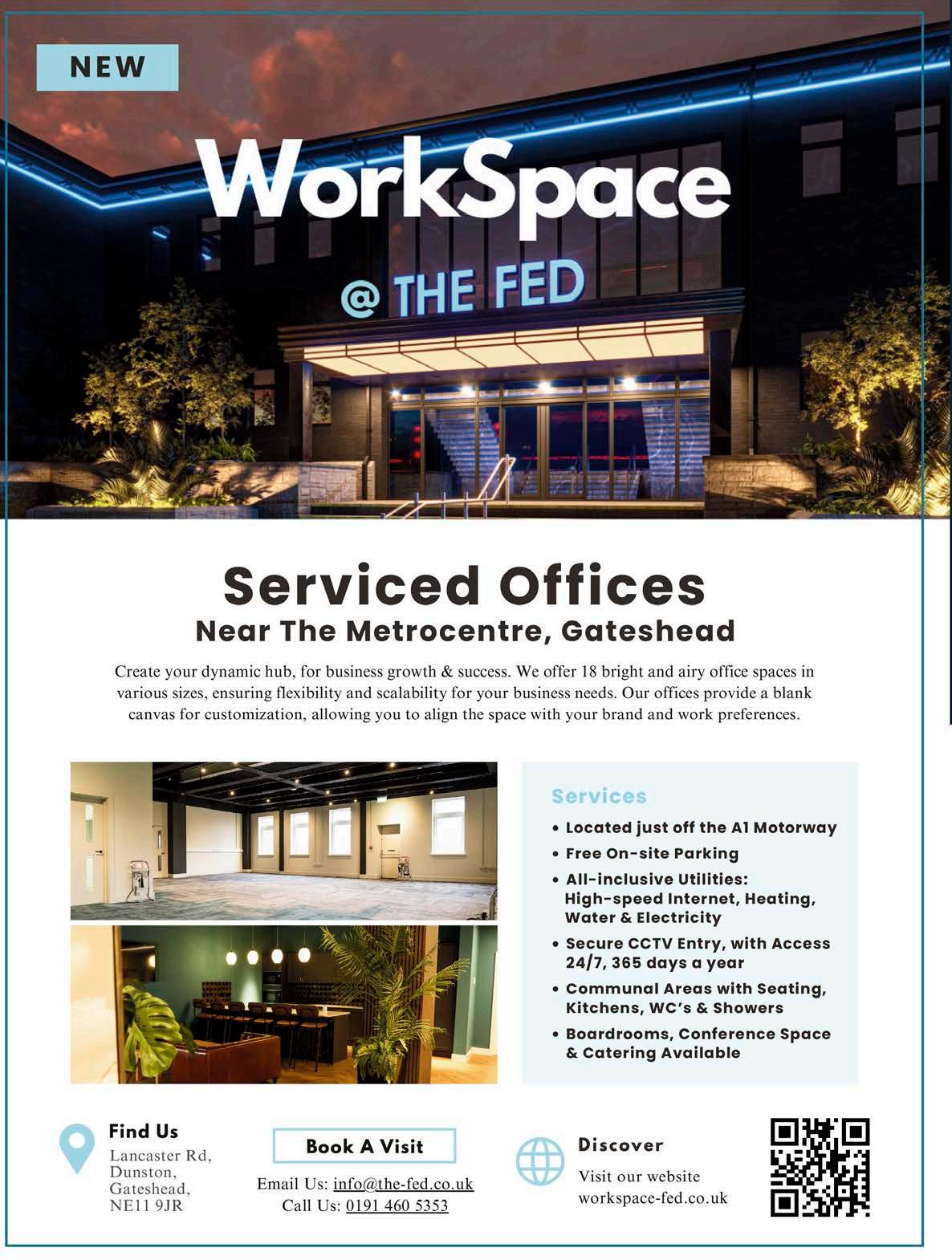



Editor
Steven Hugill steven@netimesmagazine.co.uk
Business journalist
Colin Young
T: 07808 974 533 colin@netimesmagazine.co.uk
Digital content manager
Kate Hewison kate@netimesmagazine.co.uk
Business development director
John Duns
T: 07920 152 523 john@netimesmagazine.co.uk
Creative & managing director
Peter Mallon
T: 07590 064 800 pete@netimesmagazine.co.uk
Partnership & marketing manager
Sarah Law sarah@netimesmagazine.co.uk
Digital marketing consultant Sian Anderson sian@netimesmagazine.co.uk
Finance manager
Jill Brown jill@netimesmagazine.co.uk
Filmography
Andrew Lowe andrew@netimesmagazine.co.uk
Paul Geist paul.geist.photo@gmail.com
Contributors:
Professor Darren Duxbury Matt Boyle
Lucy May
Rick Marsden
Photography:
Christopher Owens www.christopherjamesowens.co.uk
Ben Benoliel www.benbenoliel.com
Mike Sreenan www.michaelsreenan.com
Angela Carrington Krzysztof Furgala www.thisisthebiggerpicture.co.uk
Jamie Haslam www.roamwithus.co.uk
Head office
0.09 PROTO, Baltic Business Quarter, Abbot's Hill, Gateshead, Tyne and Wear, NE8 3DF
All rights reserved. Reproduction, in whole or in part without written permission, is strictly prohibited.
Circulation:
To confirm our circulation please contact Andrew Dunn, Stephens and George Print Group, email: andrew.dunn@stephensandgeorge.co.uk
To amend your mailing address or remove yourself from our mailing list contact pete@netimesmagazine.co.uk
Contact:
@NETimesmagazine
www.netimesmagazine.co.uk
Photography: All photos taken by North East Times staff are copyright North East Times Magazine Ltd, and are taken solely for use in North East Times Magazine or products published by North East Times Magazine Ltd.
If you wish to use or publish a photograph taken for North East Times, please contact pete@netimesmagazine.co.uk
Advertising charges:
There is a £25 charge for every set of amendments, following the first initial set of amendments, which is free of charge for adverts designed by North East Times Magazine Ltd.
Cancellations:
If an advert is cancelled by the booker within a seven day period prior to our print deadline, the advert will be charged in full, plus VAT.
Editorial:
Editorial must be received by the 9th of the month or no responsibility is accepted for errors. The opinions expressed in this issue are not necessarily the views held by North East Times Magazine Ltd.
Advertisements:
Although every care is taken to ensure accuracy, the publishers regret that they cannot accept responsibility for loss or damage caused by an error in the printing or damage to, loss of artwork, transparencies or photos.
Complaints:
Regarding advertisements will only be considered for up to a week after publication. Advertising must be received by the 12th of the month. No responsibility is accepted for errors.
Print:
North East Times is printed by Stephens & George Limited, a fourth-generation, award-winning printer based in Merthyr Tydfil, South Wales, which is a specialist in sheet-fed lithographic printing of magazines, brochures and programmes.
North East Times is produced using vegetablebased inks combined with innovative chemical-free plate and Heidelberg press technology.
All papers are sourced from well-managed, sustainable forests and Stephens & George’s vast supply chain holds many environmental accreditations.
In addition to this, they hold a Climate Change Agreement along with ISO14001, ISO9001, FSC, PEFC and offer Carbon Balancing via The World Land Trust.
They achieved an E2B Silver award for energy improvements along with an E2B Gold award for recycling; 98.5 per cent of all their waste is recycled.
www.stephensandgeorge.co.uk


@2024 Published by North East Times Magazine Ltd.






With the region set for watershed political change, Steven Hugill highlights how transformation runs through this issue of North East Times Magazine too…
4 Hello and welcome to the latest edition of North East Times Magazine.
I don’t know about you, but I’m ready for something a little different.
After the endlessly dark – and incredibly wet –winter months, the thought of shifting to brighter days grows more appealing with every downpour.
This year, though, a fresh climate means more than a switching of the seasons.
I’m talking about the area’s mayoral elections, which, from Northumberland to Tees Valley, hold great promise when it comes to blowing winds of change through our region.
For the latter, already an old hand at metro powers, the poll will mark a third chapter in a devolution story closing in on a decade’s writing.
For the former, though, it will mark a completely new narrative.
The North East Mayoral Combined Authority –covering the region’s northernmost enclave down to County Durham – pledges greater decision-making powers and £4.2 billion for skills, transport, housing and commercial improvements.
An umbrella for an area oft-rained upon by Westminster, it’s a chance for watershed change.
And I urge you to play your part.
One of the biggest dangers to devolution is voter apathy, a risk only heightened by recent national political fiascos and failures.
But this is an opportunity to shape the region for good, so whichever part you call home, please head to the polls.
Don’t just take my word, though.
Business leaders in a high-level roundtable discussion – held alongside national wealth management house Fairstone – tell this edition that devolution, through the lens of the North East Mayoral Combined Authority, is an “opportunity to think bigger and act very differently to how we have in the past.”
The theme of change continues with cover stars –
and Rheal Superfoods co-founders – Charlotte and Sean Ali.
Diagnosed with coeliac disease in her late teens, Charlotte tried all manner of gluten-free alternatives to transform her health, before – with the help of then fellow university student Sean – experimenting with superfood powders in their kitchen.
After much trial and error, and a few mouthfuls of mixtures more “pond water” than potent potion, the duo began refining their remedies, enrolling on a university-backed start-up programme that really catalysed their progress.
And today, the business is an international entity, with a new Wearside base complemented by a US operation.
Change also pervades our feature with Sarah Ellerby, chief executive of Teesside-based Nova Pangaea Technologies, which stands at the forefront of efforts to decarbonise the air travel sector.
A leading player in Project Speedbird, which aims to turn agricultural and wood waste into more than 100 million litres of sustainable aviation fuel every year, the firm has the backing of British Airways’ parent International Airlines Group and has received multi-million-pound support from the Government too.
But the change doesn’t end there.
She may be a leading business figure today, but Sarah was once an eight-ball pool world number one.
And, such remains her ability, she could quite easily pick up a cue tomorrow and break back into the game’s elite.
But she doesn’t want to.
Her focus is on Nova Pangaea Technologies, on bettering the environment rather than bettering an opponent on the baize.
And the North East is all the more stronger for that decision.
I hope you enjoy this issue.
Steven



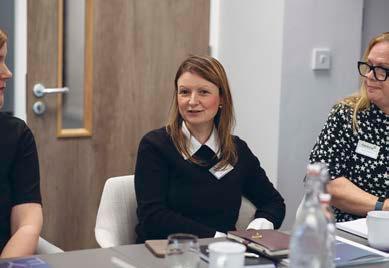


You may not have heard of Project Speedbird. But you soon will. It is a major partnership between British Airways, LanzaJet and Teesside-based Nova Pangaea Technologies, and has just secured £9 million Government funding to produce sustainable aviation fuel (SAF) and establish the UK as a decarbonisation world leader. The plan is to produce more than 100 million litres of SAF every year, which will annually reduce CO2 emissions by 230,000 tonnes. Leading the project is Sarah Ellerby. Here, she tells Colin Young the story of the Yorkshire farmer’s daughter who, having become the best professional cue sports player in the world, has returned to the UK to put the North East at the heart of watershed environmental change.
To see what Charlotte and Sean have created at Rheal Superfoods, from such a personal struggle, was inspiring.
The place is impressive and made for an interesting backdrop to shoot.
We did have a failed attempt with a pink smoke bomb, which didn’t make the edit, so I apologise to Charlotte and Sean for that one.
However, I had initially wanted to shoot them in a pit filled with their powders, so it could have been worse!
Ben Benoliel, photographer
North East Times Magazine throws a spotlight on the latest news, views, trends and technologies shaping the region’s economic and business landscape


A port operator has pledged to “drive investment, create highquality jobs and support efforts to improve social mobility” after prevailing in an “unnecessary” legal wrangle.
PD Ports says it will “work for the good of the Tees Valley and its people” after a judge threw out a right of way challenge from South Tees Development Corporation (STDC).
A technology firm plans to create 150 jobs in a £40 million office move.
Scrumconnect Consulting has expanded into Newcastle’s Portland House.
And the business, known for digitally processing court cases and passport applications, says the move will be complemented by a £40 million economic commitment across the next four years.
It also says the site, formerly home to Newcastle Building Society, will provide a base to deliver further projects, with the company recently named a partner on work to modernise HM Revenue and Customs’ IT systems.
Praveen Karadiguddi, chief executive, said: “The North East is on the cusp of devolution, and it’s a prime time for forward-thinking private sector businesses like ours to step in and play a pivotal role in unlocking Newcastle’s vast
potential.
“But our commitment is not just about expanding our footprint; it’ll help foster economic growth, create jobs and contribute to the region’s vibrant future.”
The business has additionally appointed North East native – and former head of product management – Mark Duncan as chief digital officer.
Meanwhile, Kinewell Energy says it will double its headcount after also making the move to Portland House.
The technology firm, whose software has helped deliver some of the world’s largest offshore wind farms, says it will create up to nine jobs over the coming months, with officials expecting its team to tip the 80 mark in two years’ time.
Dr Andrew Jenkins, founder and chief executive, said: “This marks the beginning of an incredibly exciting new chapter.”
The body, led by Tees Valley mayor Ben Houchen, had argued PD Ports, which acts as statutory harbour authority for Teesport, had no access rights to the Redcar Bulk Terminal loading site or nearby South Gare breakwater.
It also contended the business had no rights to an area known as South Bank, via Tees Dock, because it meant crossing the ongoing Teesworks clean energy development being overseen by STDC.
Jerry Hopkinson, PD Ports’ executive chair, said: “With this unnecessary distraction behind us, we will move on and look to the future, working with partners across Teesside and beyond, for the good of the Tees Valley and its people.”
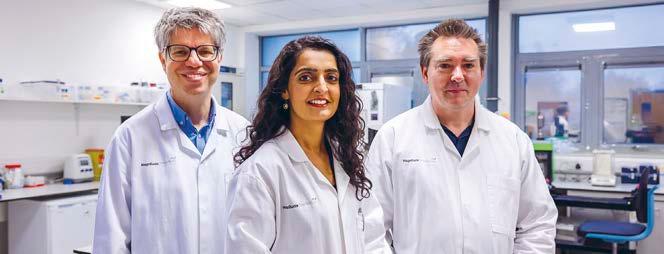

A biotechnology firm is aiming to more than double staff numbers after contract successes.
Magnitude Biosciences plans to take its 19-strong team to nearly 50 in three years.
The blueprint follows the capturing of contracts with “prominent” global clients.
The company, a Durham University spin-out headquartered at Sedgefield’s NETPark, uses nematode worms to carry out preclinical drug development and academic research.
Dr Fozia Saleem, chief executive, said: “Our success in securing contracts with new global clients, and expanding
our work with existing clients, has been testament to the dedication and expertise of our team.
“And we are thrilled to be expanding our workforce and talent to strengthen our capabilities further.”
The company last year secured a Future Economy Investor Partnerships grant of almost £250,000 from Innovate UK, which was matched by backing from the North East Innovation Fund Limited Partnership.
Dr Saleem added: “As scientists and institutes increasingly look to improve the population’s healthspan, our aim is to become the go-to contract research company for screening thousands of compound libraries and novel lifestyle products.”
Northumberland education hub secures fresh partnership Skills
A training venture focused on delivering the advanced manufacturing and energy workers of tomorrow has struck a new alliance.
Energy Central Learning Hub has partnered with Northumberland Skills.
Operating as Northumberland County Council’s post-16 education provider, it will run a campus at the new Port of Blyth-based endeavour.
Part of Energy Central Campus, a partnership between Northumberland County Council, Port of Blyth and Offshore Renewable Energy Catapult, officials say Energy Central Learning Hub will bring academia and business closer.
Richard Waterston, Northumberland Skills’ sector specialist training centre manager, said: “We’re starting a journey for the next generation of power engineers, maintenance experts and technicians.”
Energy Central Campus is a flagship project within the £90 million Energising Blyth regeneration programme, which is being delivered by Northumberland County Council.
Martin Lawlor, Port of Blyth chief executive and Energy Central campus chair, added: “It’s vital business and academia work together to bridge the STEM skills gap.”
Northumberland Skills’ training will complement an existing offer from Bede Academy, which was announced last year.
A financial advisor and wealth manager is looking to treble staff numbers following fresh investment.
Perspective Financial Group has been backed by Charlesbank Capital Partners.
Officials say the deal “enhances” Perspective’s “position as the UK’s premier client-centric financial planning firm”, and will help push its near-500 strong team to “at least 1500 staff”.
Additionally, they say the support will more than double Perspective’s 40-office footprint – which includes bases in Newcastle, Darlington, Hexham and Harrogate, North Yorkshire –to in excess of 100.
Ian Wilkinson, Perspective chief executive, said: “Charlesbank’s excellent track record of partnering with similar businesses and providing resources and financial support will enable us to further accelerate the pace and scale of our growth journey.”
Based in Boston, in the US, Charlesbank originally oversaw private equity investments inside the Harvard University endowment, becoming independent in 1998.
The agreement will see Charlesbank replace CBPE Capital LLP as Perspective’s lead private equity investor.
Tackling the financial gender advice gap - see pages 28 and 29
An engineer founded during the pandemic has expanded following rapid growth.
Family-run EM Precision has taken a second unit at Jarrow Business Centre, in South Tyneside.
Providing CNC, milling and turning support to a range of large and small organisations across the UK and beyond, the firm is led by founder Steve Cockburn.
And having recently welcomed his first recruit, the experienced engineer is now looking to take on another member of staff and create an apprenticeship role.
Steve said: “Now we have the extra unit and more space, the plan is to invest in more equipment that will enable us to expand the team further.
“We’ll always be a small, family-friendly business, but I see us continuing to grow the team.
“I’d love to take on an apprentice in the future, to support someone at the start of their career in the engineering sector, and, who knows, we might need a bigger unit again.”
A firm behind a lung test designed to boost asthma diagnosis aims to grow across the Atlantic after receiving £1.4 million backing.
PulmoBioMed has been supported to scale up manufacturing of its PBM-HALE breath analysis device and take it to US markets.
The cash will also allow the Northumbria University spin-out to expand into a Newcastle base and create seven jobs.
Dr Sterghios Moschos, founder and chief executive, said: “PBM-HALE has the potential to transform respiratory care.”
The firm’s investment round was led by the North East Venture Fund and included Northumbria University and SFC Capital.
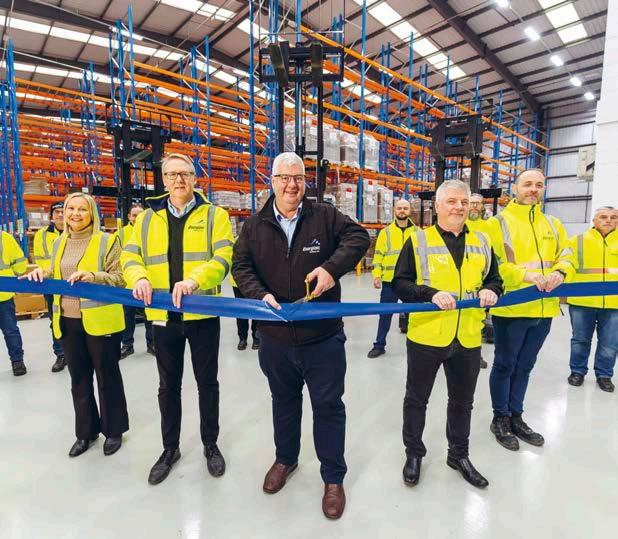
A hearing aid battery maker says it has taken the “next step in an exciting journey” following a factory expansion.
Rayovac has moved into a 37,500sq ft warehouse on Gateshead’s Follingsby Park.
It says the site, based two miles from a sister Washington manufacturing plant, will help ship around 1500 hearing aid battery packs to more than 100 countries every month.
Gary Gray, plant manager, said:
A diamond drilling and concrete sawing contractor wants 20 staff following its best year of growth in half a decade.
D-Drill & Sawing, which runs a base
“We’ve been designing and making hearing aid batteries for more than a century, and are committed to retaining our position as a market leader.
“We’re continuing to evolve our products, technology, facilities and staff to provide the best possible support to our customers; more than 100 years of continual, innovative development is kept up to date thanks to constant research and further changes.
“And our new warehouse is the next step in this exciting journey.”
Rayovac is a brand of battery maker Energizer.
near Stanley, County Durham, saw turnover rise 19 per cent thanks to a raft of new services.
Boss Julie White said: “The aim is to grow again over the next year, and we’ll be bringing through apprentices and looking to hire experienced and skilled operators too.”
A fintech company is targeting countrywide expansion after launching its first UK office in the North East.
Paynovate has moved into Newcastle.
The Belgium-headquartered firm, known for digital payment technology, says its new hub will provide “a firm base from which we can grow” across Britain.
Bosses are now looking to recruit staff for business development, customer service and IT roles.
Its arrival further strengthens an existing cluster of payment companies across the region, which includes Pockit, Kani, Paid, Thredd and savings platform provider Newcastle Strategic Solutions.
Joanne Parker, Paynovate’s UK branch director, said: “With a long history of innovation in technology, Newcastle felt like the right location for us.
“We look forward to becoming an integral part of the fintech ecosystem in the North East and making a positive impact on the local community and

A selected round-up of stories from across the region
beyond.” Hailing the company’s arrival, Dawn Dunn, Invest Newcastle’s digital and tech sector lead, added: “Newcastle is fast becoming a strategic gateway for international fintech companies looking to expand into the UK market, and Paynovate’s investment underscores the city’s potential.
“We are excited to support it on the next phase of its expansion, and hope it will give confidence to others who are thinking about Newcastle as their UK base.”

A County Durham cabinet maker says it is primed to create jobs and “take advantage of opportunities” following a factory expansion.
Trinity Kitchens has extended its presence on Aycliffe Business Park. The firm has opened an additional near 5000sq ft unit to make and paint timber
and MDF kitchen, bedroom and bathroom cabinet doors. The move was fuelled by five-figure North East Small Loan Fund support, with the cash also allowing the company – led by husband and wife team Matthew and Leanne Fisk – to create two jobs and plan for at least three further staff.
The business was supported by NEL Fund Managers to access its finance pot.
Leanne added: “NEL’s backing enabled us to get the facility up and running on schedule.”
4A training base focused on nurturing the home builders of tomorrow has moved a step closer. Work has started on Wearside’s Housing Innovation and Construction Skills Academy, which chiefs say will provide “next generation skills for next generation homes”. Overseen by Sunderland College, it is supported by partners that include the George Clarke-led Ministry of Building Innovation and Education.
4An IT support firm says it is ready to write a “new and exciting chapter” after completing a takeover. Gateshead’s Aspire Technology Solutions has bought Glasgow-based Cloud Cover IT. Under the terms of the agreement, Cloud Cover IT’s software development and business applications division has rebranded as Flyte.
4Engineer Wilton Universal Group has pledged to continue strengthening its workforce following improved financial results. The firm, based at Port Clarence, near Middlesbrough, says it will further invest in its apprenticeship academy and existing workforce after seeing turnover rise £3 million to £23.25 million.
4A subsea power line maker has committed to its North East base for another 15 years. JDR Cables has extended the contract for its 300,000sq ft Port of Hartlepool factory, which employs 280 people, with landlord PD Ports.
For more news and views across the North East, visit our website @ www.netimesmagazine.co.uk/news
As the clock ticks down to the next General Election, Steven Hugill looks at the principal parties vying for voter attention at a time when the North East’s future has arguably never been more on the line.Words by Steven Hugill
4Shhhh. Listen. Can you hear that sound?
That’s right. After hiding under a Tory tarpaulin for getting on five years, the General Election Machine is back, all fired up to spin the Westminster wheel once again.
Well, sort of.
Much like Rishi Sunak’s sputtering commitment to a date for Britain’s headline voting rendezvous, the Machine’s engine is wheezing with the death rattle of a damaged cylinder nearing its inevitable demise.
And it’s hardly surprising is it, given what we have nationally?
A Conservative Party stuck in farcical reverse.
A Labour Party – handed an open highway to victory – still planted in the middle lane in third gear.
A Liberal Democrat Party believing again after by-election successes but lacking the mileage for any truly meaningful nationwide road trip (though it should have enough juice in the tank to drive out some Tory targets in leafy southern constituencies).
Throw in mainstream voter sentiment that has been running on fumes for years, and the dashboard warning lights are twinkling feverishly.
But it’s not just a worrying picture nationally.
The stalling of any clear political direction from Westminster – and the emergence of any party truly seizing the initiative – makes for regional concern too, especially in a year where two
thirds of the North East will gain a newly-elected regeneration boss, and the Tees Valley, a relative old hand when it comes to metro powers, will hold its third mayoral vote.
A settled domestic picture is crucial.
Because while a regional mayor holds great potential to help salve many ills, they can’t deliver a complete panacea.
Yes, devolution promises freedom and cash (in the case of the new North East Mayoral Combined Authority, £4.2 billion is said to be ringfenced for skills, transport, housing and commercial improvements from Northumberland to County Durham) to better influence and steer an area’s direction of travel.
But that area still needs Government backup, especially in times of pared local authority budgets, distressing child poverty rates and household and domestic finances still in need of nurturing back to health following that minibudget.
Sir Keir Starmer, during a whistle-stop North East tour late last year, promised Labour would hold its end of the bargain if it were to take office, telling this publication it would roll out national policies capable of catalysing fresh economic growth and social mobility, all while creating “the conditions for decisions about the North East (to be made) by people with skin in the game.”
Just a few weeks later, though, he was ditching his flagship £28 billion green blueprint.
So forgive the cynic in me that continues to prod away at his pledge…
As for the Conservatives, well, at the time of writing, the country was officially in another recession, Business Secretary Kemi Badenoch was having a public spat with an ex-Post Office chair, Rishi Sunak was being investigated by Ofcom for an alleged impartiality breach for stepping into GB News' echo chamber and Lee Anderson was an independent MP, having been suspended by the Tories amid accusations of Islamophobia.
So forgive the cynic in me for wondering if anyone left around the Government table has an idea of what they’re doing…
It’s not just the north of the region where the national scene will impact the North East’s political landscape, though.
For so long propped by a Conservative Party voraciously seeking good news to keep alive its ‘levelling up’ agenda, what of Tees Valley mayor Ben Houchen?
Dealing with local authorities and their rainbow of political hues is one thing when
you’ve got a direct hotline to Number Ten.
But it’d be different again if your main political rival picked up the phone.
And that would be just the start.
The situation would be further complicated by new names and faces – so long on the other side of the garden fence looking in – wanting to know more about continued press allegations around the transformation of ex-Redcar steelworks land into the mayor’s Teesworks clean energy scheme.
It would be further complicated by reprisal of a recently-released independent report that demands greater transparency and governance of said development.
And it would be further complicated by perspectives on a decision to pick a losing court fight with Teesport operator PD Ports over historic rights of way.
Teesworks, of course, is too far down the track for any change of Government to dramatically alter its momentum.
Steelwork is rising into the sky to create a wind turbine monopile factory, and
other developments, including carbon capture and storage and waste-to-energy schemes, are also well advanced.
But it nevertheless serves to highlight an important message.
This country – and thereby this region –desperately needs clarity.
Devolution will only truly work if the powers shifted to the shires are backed by a coherent plan from Westminster’s leading party, which prioritises planning over playground pettiness and strategy over social media squabbles.
One that isn’t going to be sidetracked by horrendous crisis management; that isn’t going to be scuttled by disastrous financial blueprints; that isn’t blindsided by party in-fighting; that isn’t lost amid an inhumane obsession to kick desperate families and individuals to an arbitrary African country.
Because if it isn’t, then the country won’t reach its full potential.
And neither, by extension, will the North East.

When was the last time you used physical cash to make a payment?
How did you buy that morning coffee, refuel the car or settle last weekend’s restaurant bill?
Chances are – certainly from findings in UK Finance’s latest survey of transactional trends – one or all will have been concluded via a quick dab of card on contactless machine.
COVID-19 did many things to us all, not least inspire new attitudes to physical cash.
Indeed, as UK Finance’s numbers show, more than half of all payments in 2022 were done so with debit or credit cards.
Hence the Bank of England and Treasury’s decision to investigate a so-called digital pound.
Carrying the same value as existing notes and coins, bosses say it would complement physical cash by providing “more choice” when dealing with everyday payments.
As North East Times Magazine went to print, the Government acknowledged it was exploring “feasibility and potential design choices”, with Bim Afolami, economic secretary to the Treasury, adding it was “the latest stage in our national conversation on the future of our money – and far from the last”.
And while he stopped short of confirming the currency’s introduction, as society’s craving for contactless continues to rise, the stage would seem set for a payment revolution.
 Words by Professor Darren Duxbury Behavioural finance expert, Newcastle University
Words by Professor Darren Duxbury Behavioural finance expert, Newcastle University
As Bank of England and Treasury officials assess the merits of a new digital pound, Professor Darren Duxbury, a behavioural finance expert at Newcastle University and member of an academic advisory group helping the institutions on potential change, examines the proposed currency and its meaning in today’s world of convenience.
4The digital pound would be issued by the Bank of England and represent a new type of money, which would be denominated in sterling and come with a stable value, just like physical cash.
It would be accessible through digital wallets and used for day-to-day, in-store and online transactions.
The intention is not to replace cash, but to supplement it, acting as a riskless and universally accepted electronic alternative.
The Bank of England and the Treasury have identified a number of motivations underpinning interest in the potential introduction of the digital pound, with the reduction in cash use being a central point.
Since 2017, cash use in the UK has declined by around 15 per cent each year1
Nevertheless, cash remains the second most frequently used payment method in the UK, accounting for 15 per cent of all payments in 2021.
And while there are societal and economic benefits to the digital pound, potential risks have been voiced.
The House of Commons Treasury Committee, for example, says it could risk financial stability if consumers – en masse – were to switch bank deposits into digital pounds during periods of market stress.
There are also concerns about financial inclusion, which could suffer if the digital pound were to accelerate the decline of
cash, causing potential difficulties for those reliant on physical money.
Ultimately, its success will depend on its widescale adoption.
To provide insight into the likely speed and scale of adoption of the digital pound, we will need to understand more about the behavioural drivers of individuals’ payment method intentions and choices.
And with more than 30 years’ experience of researching economic and financial behaviour, this lands squarely in my domain of expertise.
As research I recently led with NatWest shows, there is compelling evidence that behavioural factors, including an individual’s propensity for habitual behaviour and their level of financial literacy, influence intentions to choose physical cash over electronic forms of payment.
We also found a person’s response to exogenous shocks, such as a change in economic circumstances or security breaches, demonstrate such intentions are not immune to change.
As an academic advisory group member, such insight will likely play a key role in the design phase of the digital pound, and prove essential in accurately forecasting its take up. Reference:
Established in 2017, The Common Room, notably Neville Hall, a Grade II* listed building, underwent extensive renovation in 2019, funded by the National Lottery Heritage Fund.
Founded in 1851 to improve safety in mining, the Institute, led by Nicholas Wood, pioneered mining practice worldwide.
Despite not witnessing its completion, Wood’s advocacy led to Neville Hall’s construction in 1872, serving as a hub for knowledge exchange which continues to this day.
The building now boasts modern amenities while preserving its historical charm, archive and collection, as well as striving to be a hub for engineering and innovation.
The charity aims to inspire future engineers through heritage preservation, core educational messaging and hands-on interactive experiences.
Revenue from commercial activities sustains The Common Room's mission of fostering engineering innovation and inspiring the next generation.
 Words by Matt Boyle Chair of trustees, Common Room of the Great North
Words by Matt Boyle Chair of trustees, Common Room of the Great North
As bosses behind the Common Room of the Great North seek to secure the historic institution’s future, chair of trustees Matt Boyle reflects on its celebrated past and appeals for fresh support to ensure it can be enjoyed by generations to come.
4I am writing as chair of The Common Room trustees at Neville Hall, the building which still houses the North East Institute of Mining and Mechanical Engineers, is home to some of the first lectures of Newcastle University and is a historic gem nestled in the heart of Newcastle.
The Common Room stands not only as an inspirational, historically significant physical space, but is testament also to the resilience and spirit of the North East.
As a Glaswegian, I’ve always felt an affinity for the North East and its people.
And I was really honoured and excited to get involved with Liz Mayes and the team, now nearly six years ago, to start the
restoration project.
Exactly three years ago, we acquired the keys to this magnificent building.
The journey since has been nothing short of miraculous.
We weathered the storm of the pandemic, slipping through the cracks in funding, and emerged stronger, only to face the challenges of a cost of living crisis.
Our success thus far has been made possible by the unwavering support of the National Lottery Heritage Fund, trusts and foundations, and generous private donors.
However, sustaining The Common Room has become increasingly challenging.
We inherited not reserves, but a

mortgage and additional debt, leaving our cashflow vulnerable.
Despite these challenges, our impact has been profound.
Since reopening, we've welcomed more than 57,000 visitors, with 20,000 engaging in STEM programmes.
We've worked tirelessly alongside the engineering sector, aiming to inspire the next generation of innovators and engineers, leveraging our unique heritage to shape aspirations and perceptions.
Yet, the clock is ticking.
We stand at a tipping point, facing the harsh reality of financial hardship.
The Common Room holds immense potential, not only as a cultural hub but as a catalyst for economic growth and community development in the North East.
We are exploring every avenue for support, from partnerships to public fundraisers.
Engagement with The Common Room is an opportunity to leave a lasting legacy in Newcastle and the North East.
Just as the founders of Neville Hall and the Mining Institute did in 1872, we strive to ensure this historic institution can be enjoyed for generations to come.
As I reflect on our journey, I am filled with hope and determination.
The Common Room represents more than just a building; it embodies the resilience, innovation and spirit of the North East.
Together, we can preserve this beacon of heritage and continue to inspire future generations.
Join us in our mission to secure the future of The Common Room.
Together, let's write the next chapter of its storied history.
With Prime Minister Rishi Sunak having hinted he will call a General Election “in the second half” of 2024, what policies do you want the new Government to prioritise and why?
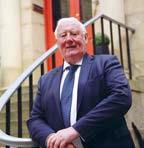 KEVAN CARRICK Co-founder JK Property Consultants
KEVAN CARRICK Co-founder JK Property Consultants
Economic growth is crucial to bringing improved wellbeing to the people of our region.
And there are key issues that need to be addressed to release property and help create that growth.
We need a strategy focused on bringing forward new initiatives to attract foreign, direct and inward investment, as well as supporting start-ups and the scaling up of SMEs, with facilities in place for training and upskilling.
We also need to scale the delivery of housing to meet the economic growth plan, bringing stability to the market by exceeding the current 300,000 homes target.
The shortage of properties for sale, rent and affordable living are driving up prices, and we must see a reversal of the inexorable inflation of house values.
The next Government must also encourage confidence for the investment in, and delivery of, employment space, and use fiscal and public sector investment powers to facilitate development delivery where viability is challenged.
The tools to deliver these matters are already in place, with the Regeneration Act 2023 and the new National Planning Policy Framework linked with increased resource and reform in planning.
Leadership from the Government and local decision-makers will be essential in implementing these strategies.

Firms have been telling me we need to take decisive action to make the UK the most competitive and trusted destination for investment.
That means implementing long-term policies and creating regulatory stability.
Key things businesses are looking for include planning reform, a concise business tax roadmap and a refreshed strategy for international trade.
But that’s not all; we also need to futureproof the UK’s labour market.
We need a workforce that is productive, healthy and happy, to fill not just today’s gaps, but those of tomorrow.
We can do that by breaking down barriers that get in the way of people getting into, or returning to, work; boosting childcare provision and enhancing workplace health policies can both make a big difference.
We also have to be relentless in our pursuit of green growth.
The next Government must honour our climate commitments and catalyse private sector investment through a net-zero investment plan.
Here, the North East and Tees Valley proposition will no doubt stand out, with competitive business incentives and a deliveryfocused operating environment.
Other crucial steps include measures to
stimulate innovation and boosting the private/ public partnership required to deliver resilient public services.
We’d also wholly welcome trailblazer devolution deals to unlock more economic autonomy.
 SHARON GRANT Director
SHARON GRANT Director
I urge any Government to prioritise several key areas.
Firstly, addressing the pay disparity between college lecturers and schoolteachers is important for fostering fairness in education.
Secondly, funding for adult skills in shortage areas, outlined in Local Skills Improvement Plans (LSIPs), is essential to bridging skills gaps and stimulating economic growth.
Thirdly, urgent capital investment is needed to modernise educational facilities, particularly in technical education, to enhance building efficiency and accommodate more learners while ensuring equipment remains current to support learner work readiness.
Efforts should be focused on helping employers, from micro to global organisations, access available skills and innovation support.
With substantial capital invested by the current Government for technical facilities across the National Institute of Technology network, securing continued national and regional support is crucial to promoting and maximising this significant investment.
Clear, coherent progression pathways, from primary to higher education, and prioritising policies promoting diverse thinking and skills development are vital to dispelling misconceptions and misunderstandings about vocational education.
Aligning industry and skills strategies, and ensuring timely indications of economic growth from LSIPs and employer representative bodies, will also support
more effective upskilling and reskilling initiatives.
Ultimately, a proactive approach is imperative to addressing evolving workforce needs and fostering a dynamic, responsive system benefiting both employers and learners.

The next Government has a real opportunity to build upon the North East’s reputation for ingenuity and innovation by retaining ‘levelling-up’ as a central policy plank.
Prioritising and investing in infrastructure and innovation creates fresh economic opportunities and attracts additional investment.
Much of the aspiration behind ‘levelling-up’ was diminished by the financial fall-out from COVID-19 and Russia’s invasion of Ukraine – two events that also highlight the importance of establishing the UK’s sovereign capabilities in everything from manufacturing to technology.
Whatever its political hue, the next Government must continue the spirit of ‘levelling-up’, given the key role this region is playing in the country’s transition to a modern, low-carbon industrial economy.
As recycling specialists, we are currently working with Teesside University, supported by funding from Innovate UK, to commercialise a prototype brick we have engineered from recycled waste clay.
We are also collaborating on a similar project to develop low-carbon concrete.
If successful, both will have a major impact on the future sustainability of the UK’s construction industry, highlighting the importance of continued investment in supporting a circular economy.
By prioritising and encouraging research and development, investing in infrastructure and supporting ‘levelling-up’, the next Government can lead this region into a future defined by innovation, resilience and prosperity.
Event_
Advertising feature_North East HR&D Awards
The North East HR&D Awards are returning to once again shine a spotlight on the sector’s leading organisations and individuals. And this year’s ceremony comes with a new partner, with North East Times excited to be collaborating on the showpiece event’s delivery.
www.northeasthrdawards.co.uk
LinkedIn: North East HR&D Awards
-
For more information on packages, or to book a table for the evening, contact events managers Lesley Hampson and Dawn Owens on 07748 908058 and 07789 666437, respectively.
Event sponsors already confirmed include Northumbrian Water, Jackson Hogg, People Science Consulting, Tailored Thinking and Talentheads.
Photography, courtesy of Reach plc, by Claire McKie-Reid & Steve Brock
The North East HR&D Awards are back.
Celebrating the amazing organisations and the skills and talent of people professionals across the region, the showpiece ceremony will this year take place at The Fed, in Gateshead, on Thursday, June 6.
Featuring a range of categories, it will again recognise the best people practices from those working across HR, learning and development and related specialisms.
But this year’s event will come with something extra too – a new partner.
The annual spectacle – now into its 16th iteration – will be delivered alongside North East Times.
Pete Mallon, North East Times’ creative and managing director, says: “We drive conversation around business, the economy and policy, highlighting those at the forefront of moves to deliver growth and support the region in reaching its potential.
“And our HR&D Awards partnership is an extension of that.”
The 2024 North East HR&D Awards will be judged by members of the North East Work and Talent (NEWT) advisory board, who reflect a cross-section of expertise and experience from organisations across the region.
Elouise Leonard-Cross and Sarah Carnegie, NEWT advisory board joint chairs, add: “We are delighted to announce our new partnership.


“North East Times shares our passion for showcasing not just the region but the rich and dynamic stories of the individuals and organisations at the heart of positive change, and we’re really excited to see the awards evolve through our collaboration.
“We all know the North East is a fabulous place to live, work and thrive.
“The HR&D Awards are about showcasing the work of people professionals across our region, who deliver excellent practices that make a positive impact on the working lives of so many people every day.
“The North East is full of ambition, pride and innovation, and organisations can help promote that by showcasing just how amazing they are at every opportunity, such as the HR&D Awards.
“This year, there are 12 categories recognising the breadth and variety of the work and challenges addressed by the people profession – so start thinking of the excellent practices you can shout about in your submissions!”
There are a number of opportunities for businesses to support this year’s ceremony, which include associate and award category sponsorship.
For more information on packages, or for details on how to buy a table for the evening, contact events manager Lesley Hampson on 07748 908058 or email lesley@netimesmagazine.co.uk
Alternatively, contact events manager Dawn Owens on 07789 666437 or email dawn@netimesmagazine. co.uk
For more information on making an awards submission, visit www.northeasthrdawards.co.uk

With the employment landscape continuing to undergo watershed revision, the value of a strong HR strategy has arguably never been more important. Here, Lauren Bathan, associate director at Jackson Hogg, and head of the specialist recruitment and outsourced talent service firm’s HR Partnership provision, tells Steven Hugill why the function is integral to company success.
www.jacksonhogg.com
@JacksonHoggRec
To find out more about how Jackson Hogg’s HR Partnership service could help your business increase its competitive advantage, call 0191 580 0495.
The commercial world is a sea of abbreviations.
And as technology and culture continue to change, so too is the depth of shopfloor shorthand growing further cavernous.
Among the countless fresh waves, though, an altogether more familiar acronym continues to lap the shoreline – HR.
Habitually maligned and oft misunderstood, the two letters, for many organisations, have long been regarded a necessary evil, a begrudging additional cost to already straining budgets.
But to take such an approach, says Lauren Bathan, an associate director at specialist recruitment and outsourced talent services partner Jackson Hogg, is to adopt a short-term view.
Instead, by actively embracing HR, and allowing a thorough strategy to wash over a wider operational blueprint, she says firms not only gain greater marketplace traction but lay the foundations for longer term success.

She says: “HR is an untapped resource when it comes to businesses creating and sustaining a competitive advantage.
“Strong HR and organisational practices allow companies to focus more intently on their objectives, be they innovation, efficiency, quality or growth, for example.
“A good HR programme fosters an environment where human capital is allowed to thrive, and delivers outcomes a firm’s competitors can neither achieve as quickly nor easily copy.
“And, as we saw with the pandemic, it also means valuable safety nets are in place to help contend with the unexpected.”
Fundamental to understanding such, says Lauren – who heads Jackson Hogg’s flagship HR Partnership service that delivers tailored support to catalyse client growth, nurture talent streams and empower positive cultures – is to look beyond the profession’s outdated stereotypes.
She says: “HR still carries perceptions of someone sitting in a musty old room, tapping out contracts and sending people dismissal letters.
“But it is far from that; HR doesn’t exist in a vacuum and it isn’t a back office function.
“It is professional, specialist support, much like that from a Chartered accountant or procurement expert, for example.”
And to maximise its impact, Lauren says HR policy must be wholly incorporated into an organisation’s overarching strategy, rather than being seen as an administrative outlier.
She says: “Organisations often fail to connect business

strategy with HR strategy.
“Leaders know how to explain the former, but can sometimes struggle to explain what is required of their people.”
And drawing the two more closely together, she says, is particularly imperative in the post-pandemic era of greater employee empowerment.
Lauren says: “It is more important than ever for companies to make true and authentic people investments.
“A business must value its people as a key strategic priority and capability.
“Present-day employees expect to be reflected in how a business operates, rather than being an afterthought.
“That means an organisation must have structures that not only understand modern people practices but harness them too.
“Bringing HR teams to the table – and including them in strategy decisions – is integral to ensuring that.”
“And we are seeing approaches change,” adds Lauren, who has helped numerous Jackson Hogg clients across the science, manufacturing, engineering and technology sectors strengthen HR frameworks.
She says: “Increasingly, firms are taking less of a mechanistic view of people and are instead seeing them as autonomous agents – a core competence,
rather than a cog – that can make a real difference.
“And a strong HR structure will only enhance that.
“For example, a business might want to be innovative, but that requires people with ideas.
“That itself requires the creation of a culture that enables people to feel safe and free to try new things and, on occasions, make mistakes.
“Furthermore, being able to look at the knowledge, skills and behaviours of the future, and map out appropriate action, is crucial to business growth – and HR enables that.
“For example, if technological changes mean a business is going to need different skills, HR can support moves to grow in-house talent if there isn’t a candidate surplus.”
Lauren adds: “There will be organisations that have enjoyed a degree of success over recent years, and therefore believe their current HR processes are working fine.
“But if a business isn’t focusing on its people, then it will eventually feel the cost.
“HR isn’t simply about hiring and firing; it is an active approach towards pre-empting tomorrow’s challenges right now.
“And any business that doesn’t see it as that is unlocking the door for competitors to use the potential of its people for their benefit.”
As our reliance on technology continues to increase, so too does the need for robust digital security. And one company ensuring organisations have such is managed services firm ITPS. Here, Steven Hugill speaks to chief executive Simon Newton and head of cybersecurity Simon Hopkin, to learn more about how it helps strengthen operators’ defences and the white paper it has published to further combat criminals.
www.itps.co.uk
LinkedIn: ITPS
To find out more about ITPS, and how its expert team could help your organisation with cloud, cybersecurity, managed services, professional services, communications and data and analytics support, call 0191 442 8300.
In business as in life, it pays to be prepared.
Volatile financial markets; supply chain strains; skills shortages; shifting consumer demands – each and all fundamental growth hurdles, which, if attempted passively, quickly become insurmountable obstacles.
And in a world where statistics show 60 per cent of small businesses fold within half a year of being caught in online hackers’ crosshairs, so too is cybersecurity.
Relief then for ITPS.
A trusted managed services partner for more than two decades, the firm is an expert digital armourer, strengthening clients’ technological advances while simultaneously bolstering shields to deflect criminals’ strikes.
“Cybersecurity is both a massive threat to a client’s business and increasingly difficult to understand,” says chief executive Simon Newton of ITPS, which operates from a base on Chester-le-Street’s Drum Industrial Estate.
He says: “Our customers trust us to manage it on their behalf, so they can concentrate on what they’re trying to achieve.
“And we punch above our weight.”
“Our very broad set of capabilities would fit much larger companies, and we bring them to bear for small and medium-sized businesses, providing support that always acts in their best interests,” adds Simon of the firm, which delivers services including cloud, cybersecurity and data and analytics assistance to public, private and not-for-profit organisations.
Intrinsic to the business’ model is its personable approach, which is showcased through GAP

Assessments that analyse clients’ processes and translate often complex terminology into everyday vocabulary.
Simon Hopkin, head of cybersecurity, says: “Our cyber and risk assessment reports are a starting point for conversations about risk, using industry best practice to assess existing platforms.
“And rather than being a hard sell, we work with inhouse IT teams to highlight a number of things, from potential online threats to achieving accreditation like Cyber Essentials.
“If a client wants to pursue the latter, for example, we would advise on the procedure and the complexity of costs, and then create an interim report that would
show board members the actions needed to achieve certification.”
Furthermore, says Simon Newton, those discussions help place firms and their IT networks in a broader marketplace – where household names including the BBC, British Airways, Boots and the British Library, for example, have all fallen victim to dark web attacks in recent months – helping remove misconceptions around hackers’ preferred targets.
He says: “Online criminals are completely indiscriminate; they will gladly hack a multinational, a junior school or a florist – it purely comes down to what they can access.”
Simon Hopkin adds: “Attackers look for low hanging fruit, and if they identify a system vulnerability, they will try to exploit it.
“No matter a business’ size, each and all must implement the same cybersecurity measures.”
To that end, ITPS – which counts clients NECS, Mental Health Matters, Hay & Kilner LLP, County Durham and Darlington Fire and Rescue Service and New College Durham among its suite of UK customers – has created a white paper that lays out the value of a robust strategy.
Highlighting the operational, economic and reputational benefits, the blueprint also spotlights the need to absorb technological advances, such as AI and machine learning, a closer awareness of regulatory change and greater cloud security into digital defences.
Simon Newton says: “When a business is hacked, it creates a real sense of violation and shock, not just for that organisation but for the people whose data has been accessed.
“If you live in a high-crime neighbourhood, you would, naturally, spend more on burglar alarms and locks than if you live in a low-crime area.
“But we all live in a high-crime neighbourhood now, given technology is such a major part of our lives, so the unfortunate reality is organisations should be spending more on locks and alarms when it comes to cybersecurity.
“And doing so not only increases safety, but can help create a competitive advantage too – making a virtue out of a necessity.
“By taking such ownership, operators are able to present themselves as brilliantly well protected, which
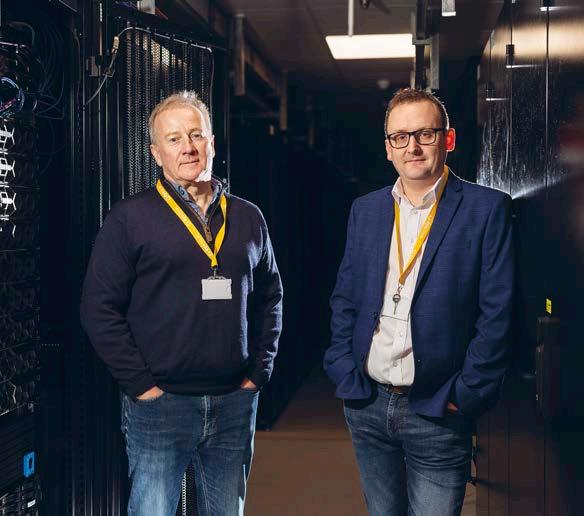
really resonates with customers, partners and the supply chain.”
Simon Hopkin agrees, highlighting the importance of policy frameworks in rebuilding from a breach.
He says: “Often, one of the biggest lessons learned following a data attack is that there wasn’t a cyber incident response plan in place, because the organisation didn’t think it would happen.
“Another is cost, with greater cybersecurity measures seen by some as a never-ending list of widgets, systems and platforms.
“But it isn’t like that, and the cost of implementing measures before an attack is always cheaper than doing so afterwards, given the subsequent loss of time and reputation, emotional stress and insurance claims.”
He adds: “And that’s where our support comes in.
“We work closely with clients, collaborating intimately to lay the groundwork for online safety.
“Our goal is to make sure they are well protected, and not vulnerable to easy targeting.
“Conversely, in the event of a security breach, we provide support, addressing both the technical aspects and providing the emotional reassurance necessary to navigate and recover from the incident.
“We are a trusted advisor in an ever-changing cyber world, a valuable support mechanism that matches moves in the landscape and allows clients to meet their goals and be successful.”
Equality is a crucial element within business and life as a whole. However, for too long the financial services industry has carried a marked gender advice gap. Things, though, are changing. Here, Ian Wilkinson, Perspective (North East) managing director, looks at the historic factors behind the divide and highlights how the Chartered financial advisory firm is helping deliver transformation.
www.pfgl.co.uk
@perspectivefgl
Operating from more than 40 bases across the UK, including sites in Newcastle, Darlington, Hexham and Harrogate, North Yorkshire, Perspective’s local offices provide financial planning advice on matters including retirement, later life and longterm care planning, inheritance tax, investments, protection and corporate planning.
We’ve seen significant improvements in equality, specifically around the gender gap, across various areas of life and business.
However, while progress has been made, the gender financial advice gap is an area in which the financial services industry needs to improve.
Without looking into this subject in more detail, you may assume there aren’t any barriers or stereotypes to impact the provision of financial advice.
Unfortunately, while there are exceptions to the rule, it would be wrong to assume men and women receive the same level of attention.
We have invested significant capital and time in

this area, resulting in the recent acquisition of AYP Financial Planning, in Hexham.
Kim Alexandra initially set up the company to focus on financial planning services for women.
Its range has evolved over the 20 years since its inception, but women-focused services are still very much part of the company's DNA, which continues to be a high-growth area of the financial services industry.
Background to the gender advice gap Statistics suggest women will account for 60 per cent of UK wealth by 2025, a trend expected to continue into the next decade.
Similarly, research also shows women across all wealth brackets will inherit 70 per cent of global wealth over the next two generations.
There are numerous factors contributing to this trend in the UK, which include more women entrepreneurs, improvements to the gender pay gap, longer life expectancy and an increased boardroom presence.
At the moment, the top five financial advice sources for women are family, money advice websites, financial planners, friends and colleagues, and Government websites and helplines.
That family advice ranks above support provided by financial planners is an obvious concern.
However, considering only seven per cent of wealth managers have specific marketing strategies to retain, attract and advise female clients, this puts
the situation into perspective.
Recent Financial Conduct Authority (FCA) data also shows women made up just 17 per cent of all FCAapproved professionals.
What are the factors influencing the gender advice gap?
It would be easy to assume a relatively low number of women financial advisers is impacting the gender advice gap.
However, a recent survey from Schroders shows 76 per cent of women have no particular preference for the gender of their financial planner.
Conversely, the main factors under consideration were trust, experience and value for money.
While looking at reasons for the gender advice gap, it's crucial to appreciate the growing demand for financial advice from women.
There are many different factors to consider, with different requirements and investment strategies for men and women.
They include:
Healthcare costs
Due to extended life expectancy, more women will require healthcare funding in the future. This should be an integral part of financial planning.
Family first
Trends also suggest women are more likely to pass on wealth in their lifetime, keen to assist their wider family as early as possible. Those unable to find a suitable financial planner may suffer undue tax consequences and see a significant reduction in net distributions to beneficiaries.
This is more prevalent among women than men, with feedback suggesting women are prepared to increase their investment if the outcome is aligned with their values.

Research by Schroders shows a staggering 70 per cent of women change their financial planner within 12 months of their partner passing.
This suggests several potential issues, including men dominating the relationship with their financial planner and a lack of trust between the surviving partner and their historic planner.
As a client-centric financial planner, we seek to provide equal and fair financial advice and guidance to everyone.
Recently, after identifying industry issues with financial planning for women, we have invested significant time and money into this area.
Men and women have similar needs regarding financial planning, but there are variations in topics.
Thankfully, the financial services industry is actively embracing equality and diversity.
If you would like to speak to a member of the Perspective team, call 0191 217 3340, 01325 289400, 01434 607808 and 01423 810210.
This article was collated using information from the Financial Times, FT Adviser, Schroders, Hargreaves Lansdown, Money Marketing, Business Sale Report, Penfold, Global Entrepreneurship Monitor and Canada Life
Diagnosis of coeliac disease can be a devastating, life-changing experience. But when Charlotte Bailey was in her late teens and told she faced a gluten-free future, little did she know just how much her life could change for the better. Sent away by her GP to fend for herself, and frustrated by the lack of support and ineffectiveness of supplements and vitamins, Charlotte and future husband Sean Ali were still students when they started to experiment with health store superfood powders in their kitchen. Here, Colin Young speaks to the couple about Rheal Superfoods, the company spawned during their university days, to learn more about how the multi-million-pound venture is expanding to help improve health journeys the world over.
 Words by Colin Young Photography by Ben Benoliel
Words by Colin Young Photography by Ben Benoliel
4Charlotte Bailey was studying for her A Levels at college in Nuneaton when she started to constantly feel tired and unwell.
A bright student, on course for the grades to enable her to study law at Nottingham Trent University, she was a keen dancer, and as fit and healthy as any normal teenager.
But when she started losing weight, and began to struggle with fatigue and digestive problems, she was referred by her GP for exploratory tests and scans.
Eventually, she was diagnosed with coeliac disease, a serious autoimmune disease affecting one in 100 people, where the ingestion of gluten – the protein found in wheat, rye and barley –leads to damage and tearing to the small intestine.
The diagnosis was to be devastating and also life-changing for her, but in ways Charlotte could have never predicted.
And she knows she’s one of the ‘lucky’ ones; it’s estimated only 30 per cent of people are properly diagnosed with the condition.
There is, however, no cure or medication to control the internal damage when a coeliac sufferer fancies a beer or a sandwich.
The only treatment is to avoid gluten. Full stop.
“It all happened within about six months, which was quite quick,” says Charlotte.
“A lot of people live with coeliac disease for many years, and don't realise they have it, but with me, because it was so sudden, it was noticeable that something was wrong, and we needed to get the answers for it.
“So we did.
“When you get that diagnosis, you're basically told, ‘stick to a gluten-free diet
for life’.
“And that's all you can do. Just accept it. Off you go. There was no support.
“I really struggled to accept it mentally.
“I’d never had anything wrong with me my whole life, I was never an unwell child.
“I just was so angry and frustrated, and I just didn't understand why this was happening to me.
“I remember my dad took me to Sainsbury’s because they had a little gluten-free section.
“It was very small compared to what they have in supermarkets now; it was a couple of shelves at the back of the store with some gluten-free bread and pasta.
“My poor dad, bless him, he didn’t know what to do.
“He just stood and said, ‘is this it?’”
That night, both Charlotte’s parents took up a gluten-free diet to support her, and share her frustration at the lack of options on the market.
“A loaf of bread is still daylight robbery,” she says.
“And unless it’s at a five-star Michelin restaurant, forget it anyway.”
She met future husband and business partner Sean Ali, a native of South Shields, in their second year at Nottingham Trent University, where he was studying business management and economics.
“We were actually living in the same building in our first year,” says Sean.
“We knew of each other, but never really spoke, and then we met on the first night out of second year.
“It’s a tradition for all the Nottingham Trent societies to wear fancy dress, go into Nottingham and end up in Ocean and its sticky carpets and 90s, S Club 7 vibe.
“We met in the queue outside.”
Sean adds: “After I spent some time at East Carolina University, in America,
I came back in 2016 and we moved in together for our final year.
“I started to realise how affected Charlotte was by coeliac disease and being rundown and feeling fatigued.
“In January 2017, we thought, ‘why don't we look for more natural ways to help?’”
Charlotte says: “I had my gluten-free boxes of pasta, and I thought I could live off that, but I just had no energy.
“I was still really underweight and not eating the right things to support my health.
“I tried multivitamins and supplements,
but nothing was working.
“I clearly needed more nutrients in my diet to give me more energy and improve my immune health.
“But I didn’t know where to start.
“All I knew was that I needed something.”
Sean researched superfoods online and, after raiding the shelves in Holland & Barrett, they set up a makeshift lab in their Nottingham kitchen and started experimenting, mixing the likes of spirulina powder with wheatgrass powder, adding plenty of water.

Stir. Down in one. Not unlike a night out in Ocean, really…

“Some of it didn't taste very good at all; it was like pond water,” says Sean.
“I’d looked into the superfoods that could help Charlotte have more energy and better digestion.
“So we just added these different superfood powders together, putting a bit of each into water or a smoothie and, after a few weeks, we both felt the difference.
“I was always fit and healthy, but I really noticed feeling more energetic and focused, especially when I was trying to get through my dissertation in the library.”
It was a business turning point for the couple, who married in Ibiza last year, even as they were finishing their degrees.
They realised they could enhance the lives of fellow coeliacs with their unique potions.
“We were inspired,” says Charlotte.
“I wanted to take control of my own diet and health, but supplements and multivitamins were not doing the trick.
“Superfood powders are just nutrient dense ingredients that are dried into a powder, easy to add into things and mask in a smoothie if you struggle with the taste of it.

“I felt empowered to take control of my own health and wellness, and make a change.
“We both felt a noticeable difference, and we came to the realisation more people needed to be aware of it.”
Sean adds: “We were in my uni room one night and I said, ‘this tastes like crap, these products don't taste good - why don't we create our own range of superfood blends that taste good?’
“I remember that night, I literally couldn't sleep.
“I woke at three in the morning thinking, quite naively at the time, ‘this is a really good idea’.
“I couldn’t wait to get started.
“It has taken a long time to get here from that moment.”
Rheal’s inception came in The Hive, Nottingham Trent’s start-up programme, which offered support and mentoring – and access to the university’s food science department.
And when they weren’t cramming in time to complete their dissertations,
Charlotte and Sean were in the labs, working with experts to develop their first products.
They were ready to launch when they graduated in June 2017.
Sean says: “We ordered a lot of different superfood powders and started testing different products in the lab, and worked with a food scientist to create nutritionally dense products that had a well-balanced taste.
“Take Clean Greens, for example. It contains five nutritious super greens and freeze-dried pineapple and baobab.
“We made the decision from the start of our journey that we didn't want to add any artificial ingredients, that we just wanted 100 per cent whole foods.
“And we can make our products without any of the nasties.”
The launch of the Super U website –the original name of the company – on Shopify, in November 2017, coincided with the couple’s switch to the North East.
They moved in with Sean’s parents, using their South Shields home as a temporary storage unit.
And they soon found the retired police officers were more than happy to embrace the entrepreneurs and get involved in their business.
Sean says: “I’ve still got a photo of the first pallet when it pulled up outside the house.
“It was literally a quarter pallet on my parents’ drive, and we were so excited.
“That was 80 per cent of the money we’d saved.
“We had ten grand in savings between us, and it was all on that little pallet.
“And then we launched.

“We just knew it was going to work because we had felt the benefits with Charlotte’s struggles with health.”
As well as launching their own website and working overtime on their social media accounts, the pair went on the road in their small white Seat Ibiza.
They travelled up and down the country to food fayres, markets and consumer events with a fold-up table, a cloth and a box of their new superfood powders in the Ibiza’s boot.
Charlotte says: “I met so many people who really resonated with my journey and my health.
“They were coeliac, or had Crohn’s, and they’d tried so many things; they just needed more in their diet to feel better.
“A lot of those customers are still with us today.
“I’m really glad we did those events.
“We had a lot of fun in that first year; it was tiring, but very rewarding.”
But just as Charlotte’s health issues were under control, they were dealt a huge blow on the first anniversary of the launch when Sean was diagnosed with Hodgkin's lymphoma.
At the end of a routine meeting with their business mentor in Newcastle, Sean noticed a hard lump above his collarbone.
He says: “I wasn’t worried at all, I just thought it was a swollen gland.
“When we went to A&E, they said my bloods were fine and sent me for tests.
“I never Googled it,” he adds.
“I did. Regretfully”, says Charlotte.
More tests, more scans, more anxiety.
Within a month, Sean was undergoing chemotherapy.
He got the all-clear in July 2019, and remains so.
“That was a huge challenge, beside the business,” he says.
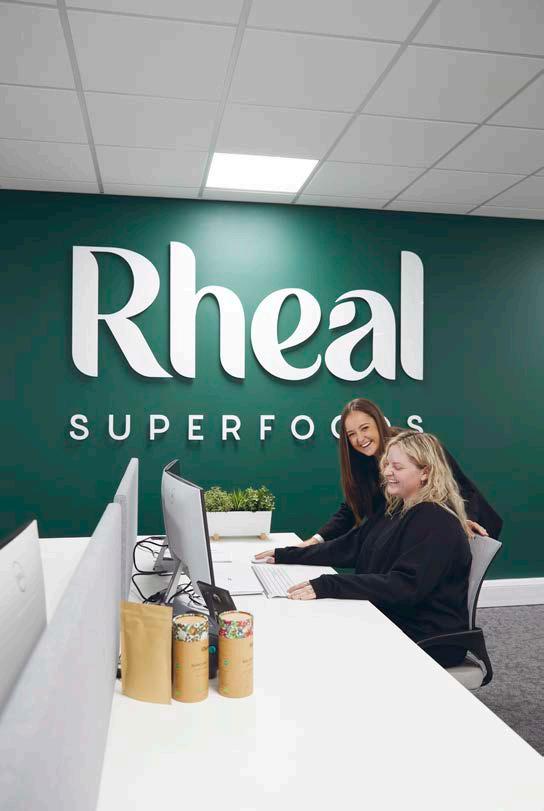
“I had treatment every two weeks, and I’d be bed bound for a week, then I'd have a good week and we’d work.
“I was probably able to do more than Charlotte because she was focused on looking after me.
“We still managed to grow the business, and every year it has grown by more than 200 per cent.
“That showed us enough to see there was something there.
“And then me getting the all-clear, going through that, just gave us even more fuel.
“It gave us more motivation to spread the message of health and looking after
yourself.
“From then on, we really gave the business our all.
“We raised our first round of investment – £160,000 for 15 per cent equity in the business – on the crowdfunding platform Seedrs.
“That was the first bit of investment and cash we had to drive the business forward.”
Understandably, the pandemic, with the world population becoming increasingly obsessed with healthier eating, was a successful time for the business.
Still living with Sean’s parents, they had
to rent a small unit in South Shields Business Works to keep up with demand, which, along with the supply chain issues at the time, was a testing period.
Later that year, they were encouraged to appear on BBC show Dragons’ Den and, before all five Dragons offered to invest, found a novel way to practice their pitch in the ten days they were given by the show’s producers.
Sean says: “I’ve watched it for years and years, but I always thought I wouldn’t have the nerve to go on and pitch.
“But we thought, ‘what have we got to lose?’
“We got a picture from Dragons’ Den on the telly on the wall, and we stood and pitched to them in the living room.
“It was surreal, but the pitch just went unbelievably well, and then we smashed every question out of the park.”
The pair agreed a deal with former Dragon Tej Lalvani and long-standing Dragon Peter Jones.
Over the months following filming, they eventually agreed a private investment deal with Tej.
And when the programme aired six months later, the business took off to new heights.
Sean says: “It was still COVID-19 times and sales were going really well.
“We were already on this crazy journey with the growth, but the exposure of the show just catapulted the brand.
“In year three, we did half a million in sales. And in one month after the programme went out, we did more than that whole year.
“With people seeing us on the television, seeing the products, our story and how all
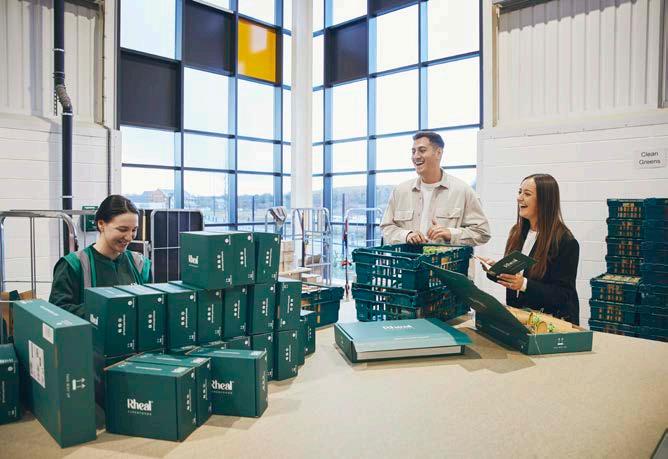
the Dragons liked it, sales that night went nuts.
“We raised another £1 million in investment, and have just massively pushed on since.”
The pair have now moved into Turbine Business Park, near Sunderland, and have started expanding their team and their product range to include the likes of caffeinated energy bars and more innovative blends.
Last year, they set up a new operation in the US, and after working from LA for 16 months to lay the foundations for that expansion, are now ready to grow further from their impressive new base near Nissan’s Wearside plant.
Charlotte adds: “We’ve built an incredible team, focused on building a brand and improved our operations as a business.
“The last three years have been the craziest journey and experience.”
Sean adds: “We now have more than 30 members of staff, with half based in the North East.
“Building a team that is really behind the mission is definitely one of the proudest
things we’ve done.
“We closed our sixth year in October, and we did £20 million in turnover, which is just surreal.
“We have a good product, an amazing brand and a very strong story, and with all those things, we’ve managed to do really well.
“I think a business that is created to solve a problem, and comes from a genuine desire to do good in the world, will do well.
“Our business today is 95 per cent online and five per cent retail, which we only really started this financial year when we launched with Holland & Barrett.
“We’re already number one and two in their superfood category, and we’re now looking at launching with Tesco.
“So, over the next year, retail will play a bigger role.
“There is so much opportunity.”
Charlotte adds: “I think customers trust our brand now.
“We always listen to them, and we just know we can continue to develop and enhance our product offering.
“It’s such an exciting time for everyone involved.”
Leading regional law firm for business Muckle LLP has become the first legal company across the North East and Cumbria to achieve B Corp status. Here, senior partner Hugh Welch talks about the significance of the accreditation and why the Newcastleheadquartered firm is committed to driving positive change.
For more information about Muckle LLP, its B Corp accreditation and the range of legal services it provides, visit www.mucklellp.com
www.muckle-llp.com
@MuckleLLP
Ben & Jerry’s, innocent drinks and Patagonia are just some of the more well-known 8100 B Corps, which sit across 161 industries in 95 countries.
In 2024, leading regional law firm for business Muckle LLP joined the ranks, becoming the first legal firm in the North East and Cumbria to do so.
In a world where it is becoming increasingly important for businesses to play their part in driving societal and environmental change, B Corp certification has become a mark of distinction for companies prioritising purpose alongside profitability.
Started by the non-profit B Lab, B Corp accreditation is awarded for social and environmental performance, transparency and accountability.
Rather than focusing on a single goal of delivering a

financial return, a B Corp adjusts this position so that employees, suppliers, the environment and the wider community also get a look in alongside profit.
Muckle’s senior partner Hugh Welch, who heads up the firm’s ESG programme, says: “Becoming a Certified B Corp is a wonderful endorsement of all that we are doing.
“The B Corp business impact analysis tool provides a comprehensive framework that supports continuous improvement.
“Our goal is to increase our initial score by a minimum of ten per cent when we are reassessed in three years’ time.
“This isn’t just a tick-box exercise for us – we started this journey because we want to be held accountable and to continuously improve.”
Hugh says the idea of becoming a B Corp was first discussed some years ago, with the equity partners giving it their full backing in 2021.
He says: “It was key that the equity partners were all completely in favour of this journey – not least because there are legal requirements to the process, such as amendments to our members’ agreement, to instil the B Corp philosophy within our constitution.
“Overall, we needed to change very little to achieve accreditation because running this firm with an eye on supporting the community is what we’ve been about for a long time.
“I wouldn’t say we sailed through the process.
“It was challenging and demanding, but it seemed we had most of the policies and procedures in place in the way we were already doing things.
“Purpose, with a capital P, has been part of this firm for a couple of decades.”
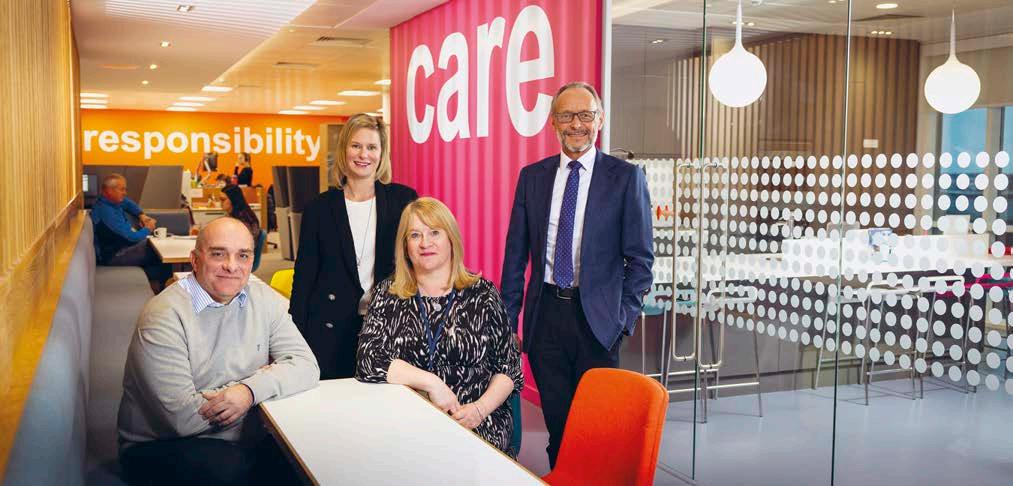
Muckle has long championed community giving.
The firm’s fund at The Community Foundation was set up in 2002 and has since given almost £700,000 to charities across the North East and Cumbria.
The firm also encourages its people to give their time, with every employee getting two volunteering days a year and providing legal work pro bono.
One of the areas where the firm scored full marks was for the health, wellbeing and safety of its people, mirroring the accolades the firm received in the last 12 months, which have included being named ‘Best Place to Work’ at the North East Business Awards and, most recently, maintaining Better Health at Work Award ‘Excellence’ accreditation.
It was also recognised for its work towards diversity, equality and inclusion – winning ‘Most Inspiring Employer’ at the North East Chamber of Commerce’s Inspiring Female Awards.
In March, B Corps of all shapes and sizes will come together to celebrate B Corp month – an annual campaign aimed at raising the profile of the certification, as well as encouraging collaboration and best practices.
Regional B Corps include accountancy firm Robson Laidler, Scott Logic, Just Williams, Sail Creative, UMi, Berghaus and Space Architecture.
Hugh says: “As a business committed to driving positive change, we understand the importance of collective action. It allows us to share knowledge, insights and best practices, and by working together with other regional B Corps, we can hopefully use our influence to encourage and support more businesses in the North East and Cumbria to embrace this standard for sustainable business excellence.
“As a firm, we’re excited about the opportunities being part of the B Corp community will bring.
“Our people are proud to work at Muckle, and that pride comes from seeing there is more to law than just making a profit.
“I also genuinely believe that business can – and should – be a force for good, and I hope that we can continue to be that force through our B Corp accreditation.”
Managing partner Jason Wainwright adds: “Our commitment to becoming a B Corp aligns seamlessly with our longstanding values of trust, teamwork, responsibility and care.
“As a firm deeply rooted in our local community, we recognise the importance of using our platform to drive positive change.
“Becoming a B Corp is a natural progression in our journey toward a more sustainable and responsible legal practice, and we are excited about the possibilities it brings.”
People are fundamental to any commercial success, and helping join the very best talent with employers across the region’s northernmost county is Connect Northumberland. Harnessing significant industry experience, it is working to create a vibrant employer community, wherein organisations’ voices are amplified, greater collaboration is nurtured, new leaders are developed and high-level staff are attracted and retained. Here, Steven Hugill chats to chair Brian Palmer, to learn more about the pioneering endeavour.
www.linkedin.com/company/connect-northumberland zoe@connectnorthumberland.org
“I’m an entrepreneur, so I’m used to joining the dots and understanding when there is a time and a place to do something.
“And this felt like a time and a place.”
As founder of Blyth-based robotics firm Tharsus Group, Brian Palmer knows all about technology’s inherent value in delivering next-generation change.
He also knows, though, that such automation is only one chapter in a much wider transformation narrative.
Another is a cohesive commercial environment, wherein public and private organisations, education providers and the third sector readily coalesce.
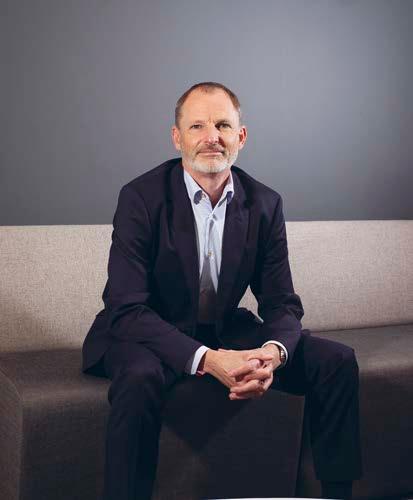
For more information about Connect Northumberland, and how your organisation could benefit from the venture, email project manager Zoe Maylam, using the email address at the top of this article.
Enter Connect Northumberland, the employmentfocused, place-based venture, led by chair Brian, which is helping create a vibrant, sustainable employer community and increase prosperity across the region’s northernmost county.
Supporting employers to access skilled personnel for existing endeavours, it is also building frameworks to mould talent – be that homegrown staff or those from farther afield – across multiple rungs of tomorrow’s career ladder.
Furthermore, its blueprint includes a mission to return many of the county’s 10,000 economically inactive people back to employment.
Brian says: “The anticipated arrival of Britishvolt to Cambois shone a light on the brownfield assets of Northumberland, and the associated employment opportunities.
“And with that, alongside changes at local authority level, it became clear there was a real opportunity to unite people and business, to create a larger and more capable workforce, one that could grow by as much as ten per cent over the next decade.”
From those early days, Connect Northumberland now counts funding support from the Royal Academy of Engineering alongside partnerships with Newcastle Business School at Northumbria University; University of Sunderland; Northumberland County Council; North East Times; Northumberland College; talent consultancy Opportunity Global; and John D Leighton Training.
Central to its draw is a unique model that replaces the prosaic with the proactive through granular research –carried out by members of Newcastle Business School – which marks potential change against the county’s
commercial complexities.
Brian, who received an OBE for services to manufacturing and skills in the New Year's Honours List, says: “There isn’t a general understanding of the challenges facing Northumberland compared to, say, County Durham, which, despite being another rural county, has a very different economic make-up.
“Northumberland needs its own place-based solution, and by generating data to create subtleties, we’re ensuring it has such.
“Essentially, we’re using Northumberland’s difference to make a difference, adopting a sector agnostic approach that is focused on providing fresh futures for existing and future employers.”
He adds: “Our initial research identified a number of challenges, not least that the population of 25 to 50-year-olds has dropped by 20 per cent in Northumberland over the last 20 years.
“It also showed an insular element to business, given the county’s geographic spread, and that it doesn’t have enough employers of sufficient size, or have a big enough critical mass of one sector – like Sunderland has with the automotive industry, for example – to properly engage with the outside world.
“However, by creating a community, we’re giving employers a much louder voice.”
And that audibility, says Brian – who is supported at Connect Northumberland by steering group members Audrey Kingham, Caroline Theobald and Ian Ritchey – is increasing openness, which itself is redefining attitudes towards change.
He says: “We’re seeing a real impact around apprenticeships.
“Lots of companies have histories of recruiting apprentices and trainees, but some have never done so.
“But by putting them in front of other businesses that have well-established training programmes, like Egger and AkzoNobel, they are able to understand the practicalities and the powerful benefits.
“We’re also breaking down geographic barriers by allowing people, who may have spent a long time at one business, to gain a bigger picture.
“Our leadership training cohort, for example, is spread across nearly 20 organisations, with each session taking place at a different employers’ site.
“That means everyone involved will gain a much better understanding of the county, but also how different businesses work.
“We’ve already got a waiting list for our executive
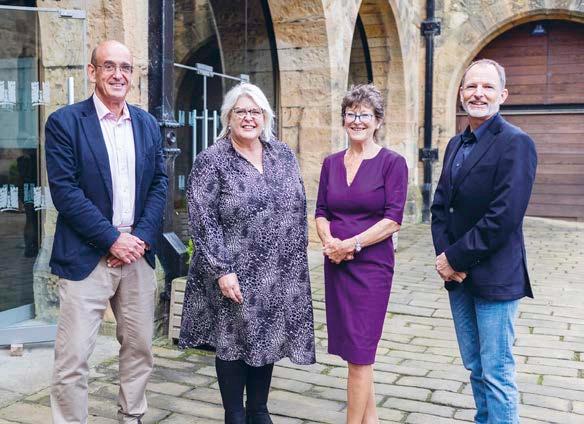
mini-MBA course, and our essential management course, for people coming into supervisory roles, is very popular too.”
And by equipping firms and individuals with the tools for meaningful progress, Brian says Connect Northumberland is ready to help drive a new industrial revolution across the county, wherein headline renewables developments continue to be matched by progress across further sectors including healthcare, advanced manufacturing, agriculture and tourism.
He says: “Northumberland has a real opportunity for a post-coal economy.
“The flywheel is already moving when it comes to clean energy, with investments like subsea cable maker JDR’s factory at Cambois and further activity at Port of Blyth.
“And a lot of the skills needed for that sector are transferable; if you took a battery plant or offshore wind engineer, for example, around 90 per cent of their skills would be the same as those needed to work in automotive or robotics.
“The crucial thing, though, is enabling that crossover to happen not just across renewables, but across all sectors, and that is what Connect Northumberland has been established to deliver.”
He adds: “We’re adopting a measured approach, based on data and analytics, that will be refreshed annually to keep pace with change.
“Ultimately, we’re joining the dots to build something for the long-term that will bring opportunity for Northumberland and its employers and people.”
Creating a blueprint for success across the region’s new political landscape
It’s been a while coming.
Ever since George Osborne’s proposed devolution deal collapsed eight years ago, the North East’s political picture has been somewhat fractured.
The region stands on the cusp of historic political change, as voters from Northumberland to County Durham prepare to elect a regeneration boss to lead the new North East Mayoral Combined Authority.
The move, said to be worth £4.2 billion, pledges to create as many as 24,000 jobs and pump cash into skills, housing and transport improvements by transferring decision-making powers from Westminster.
Here, in the first of a series of six executivelevel roundtable discussions hosted by Fairstone, the UK’s fastest-growing wealth advisory firm, alongside North East Times, regional business leaders analyse the seismic statutory shift in great detail, highlighting areas of opportunity and the actions needed to secure further growth.
While the Tees Valley readily embraced metro mayoral powers, the rest of the region – from County Durham to Northumberland – remained slower on the uptake.
Until now.
With local leaders having approved a revised £4.2 billion Westminster offer in late 2022 – which officials say will help create 24,000 jobs and leverage billions of pounds of private sector support – the majority of the North East stands ready to embrace a new political epoch.
But, said John McCabe, chief executive of the North East Chamber of Commerce, it will only be successful if the North East Mayoral Combined Authority’s figurehead is accompanied by a refreshed attitude to change.
He said: “Devolution is about making lives better, and it if works, it will deliver more job opportunities and career prospects, better housing and quality of life, and improve people’s ability to move around the region.”
Lee Hartley, chief executive at Fairstone, the UK’s fastest-growing wealth advisory firm, whose headquarters are based at Doxford Park, agreed, urging the region’s commercial sector to play its part.
He added: “Success will come from big business doing big things and creating jobs.”
Jen Hartley, director at Invest Newcastle, the body that helps firms relocate and expand across the city’s footprint, offered a similar take.
Spotlighting the scope afforded by devolution to redraw the North East’s corporate ambitions, she highlighted the opportunities at play from replacing de facto Whitehall policy and philosophy with greater local knowledge and input.
Words by Steven Hugill Photography by Angela CarringtonShe said: “We want research-intensive, highly-skilled
ROUNDTABLE: HOW CAN THE NORTH EAST CAPITALISE ON DEVOLUTION?

jobs around which we can build ecosystems, as well as a good mix of foundational economy jobs, so we can reach into communities and ensure nobody is left behind.
“And devolution will allow us to dictate an industrial strategy that helps achieve those goals.”
For any outsider to the region – and a good deal of natives too – the North East’s political scene makes for a complex web.
The North of Tyne Combined Authority; the North East Combined Authority; the Tees Valley Combined Authority; 12 local authorities – each and all different entities in a single geography.
The devolution deal, though, said roundtable members, can cut through the knot and create a much more streamlined and understandable environment.
John said: “It’s critical we get the two combined authorities working together.
“Day to day, businesses don’t work within the boundaries set by politics; employees, customers and supply chains exist across local and combined authority geographies.”
Mark Stoner, chief financial officer at Port of Tyne, added: “We need to get out of our silos and do what is right for the North East.
“We need to use our infrastructural assets to grab the leading global businesses.”
Alison Gwynn, chief executive at North East Screen, which develops and champions the area as a film and television production hub, also pointed to the power of collaboration.
Drawing on the organisation’s ongoing work with the BBC, to expand the broadcaster’s production volumes in the region, she said: “It saw a problem that needed fixing, and partnership kick-started the solution.
“We were tasked with bringing the combined authorities and 12 local authorities together.
“We’re now two years into the project, and we’ve smashed every target out of the park.
“When the world knows you’re open for business, and you have ambition, then business responds really quickly to that opportunity.”
The North East is many things, not least innovative and inspiring.
Yet despite those facets, it remains, to a large degree, introverted.
And, said roundtable members, if the region is to truly benefit from its devolution deal, it must shed its metaphorical cloak of modesty.
Speakers pointed to the ripple effect on investment decisions, saying the North East must identify and celebrate the sectors where it is leading next

“Devolution is an opportunity to think bigger and act very differently to how we have in the past”
–John McCabe, North East Chamber of Commerce chief executive

“Let’s not be meek or quiet; let’s be loud, brave and bold”
–Lee Hartley, Fairstone chief executive

“When the world knows you’re open for business, and you have ambition, then business responds really quickly to that opportunity”
–Alison Gwynn,North East Screen chief executive
generation change.
Gary Chapman, head of the North East and industrials and infrastructure director at Lloyds Banking Group, said: “It goes against our culture sometimes, but let’s push ourselves a bit more.
“We need a proper narrative, one that showcases what the region is focused on, which could be advanced manufacturing or green energy.”
Lee added: “Let’s not be meek or quiet; let’s be loud, brave and bold, and champion the brilliant businesses we have.”
Jen agreed, saying such moves would provide a framework to build upon existing investment that includes the recently announced £50 million North East Space Skills and Technology Centre, which is led by Northumbria University and counts global aerospace firm Lockheed Martin UK as a partner.
She said: “We know we can do more, and devolution will allow us to speak with one voice, to promote our message globally.”
The implications of such, added Jen, would be far reaching, not least on the industry grapevine, where North East company advocates could help amplify the narrative.

“We need to get out of our silos and do what is right for the North East
–Mark Stoner, Port of Tyne chief financial officer
Using her time as head of the Japanese inward investment desk at former regional development agency One North East, she said: “I managed teams out of Tokyo and Osaka, which had daily conversations with companies like Nissan, Hitachi, Panasonic and Fujifilm – and there is a lot to be said for those incountry relationships.
“We’re wrong to think that all UK embassies, consulates and high commissions are always batting for the North East.
“If a company has a conversation with an overseas delegate and says, ‘I want to be in London,’ that delegate won’t necessarily question that, or won’t always put the North East forward as an alternative base.
“But if we use our partners in the marketplace, we can increase the region’s message.”
Mark said the North East must “generate excitement and ambition,” pointing to the PR machine behind Greater Manchester mayor Andy Burnham.
He said: “We must improve our face to market and what devolution means for our population.
“Look at Manchester – when it makes an announcement, it does so in a very drilled way.
“We must do the same.”
Malcolm Clarke, public affairs business partner at Northumbrian Water, agreed, saying the area’s new figurehead must complement Westminster connections with a strong grassroots presence.
He added: “The mayor has to be a very visible figure, and has to push to create a profile that helps make a difference.”
Based within a goal-kick’s distance of Sunderland AFC’s Stadium of Light, on the pocket of land by the River Wear once home to Monkwearmouth Colliery, stands the skeleton of the new Housing Innovation and Construction Skills Academy (HICSA).
It makes for a rather poetic scene.
For where miners once helped stir industrial revolution, HICSA is set to play its part in a similarly watershed period, by arming learners with the techniques needed to build, retrofit and create the accommodation of tomorrow.
And, said Iain Nixon, group vice principal – partnerships and commercial – at Education Partnership North East (EPNE), it is a textbook example of the long-term and regionally-focused planning that underpins devolution.
Referencing HICSA’s rollout, which will be overseen by EPNE’s Sunderland College arm alongside a number of fellow training-based associates, including the George Clarke-led Ministry of Building Innovation and Education, he said: “People and skills are critically important to how we seize this opportunity.
“HICSA is there to support traditional trades, like bricklayers and joiners, which are not disappearing.
“But it’s also there to support industry as we decarbonise and introduce new environmental technologies and building techniques.”
Iain also reiterated the importance of relationships, both in HICSA’s operation and across the wider commercial landscape, which he said would help provide industry with a continuous conveyor belt of talent, rather than sporadic output that encourages cannibalisation across the skills market.
Referencing EPNE’s work with Fulwell 73 – which aims to bring the £450 million Crown Works Studios film-making complex to Sunderland – he said: “When we look at devolution, and specifically manufacturers investing in the region, their biggest challenge will be starting production, because that requires skills.
“Historically, though, the region hasn’t invested to meet that need.
“But if we plan better and train for growth –overtraining in some areas before those skills are needed – we can avoid some of that competition.
“And our work with Fulwell 73, to develop a skills strategy for Crown Works Studios, is a good example of how to get ahead of the curve.”
Lee and Dr James Widmer, co-founder and chief executive of Washington-based Advanced Electric Machines, highlighted practical educational and infrastructure-related hurdles to be surmounted if the region is to nurture the skills base it craves.
Calling on the Government to revise the parameters of a flagship training pot, Lee said: “We can’t find a single course that is relevant to our Apprenticeship Levy funding.”
And placing the skills drive within the aforementioned regional narrative revamp, Lee added: “We have fantastic universities, but graduates see the region as a great place to come and study, rather than a progressive place to build a career.”
James, whose firm makes electric motor and powertrain systems for cars and trucks, cited the challenges caused by the North East’s location.
He said: “If you’re going to make something in this country, then the North East is the place to do it.
“But the region is not commutable; you have to move here.
“We will develop our own skills for future industry, but that takes time, and you miss opportunities if skills are not mobile.”
IS IT THE NORTH EAST’S BUSINESS COMMUNITY AND WIDER POPULATION PROVIDES A FOUNDATION FOR THE ELECTED MAYOR TO MEET DEVOLUTION GOALS?
As much as responsibility for devolution’s success will sit squarely on the newly-elected mayor’s shoulders, roundtable members said their mission must not be a solo venture.
This, they said, would help drill deeper into the region’s priorities, therefore strengthening their mandate to fashion meaningful change.
Alison said: “The job for any mayor is huge; it is impossible for one human being.
“We need big business, big talent and big individuals all singing from the same hymn sheet.
“And we can do that while using the learnings – good and bad – from other regions that have gone through devolution.
ROUNDTABLE: HOW CAN THE
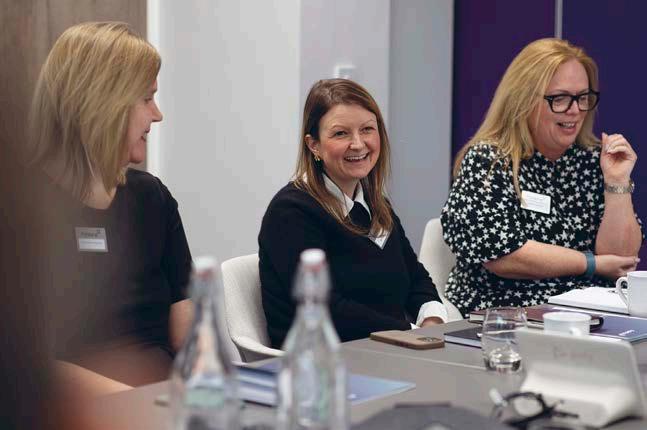
“It’s what you would do in business, so let’s use it to our advantage.”
John urged the commercial world to talk about devolution and strip away potential complexity, which he said would generate greater buy-in that, in turn, would resonate along the corridors of Whitehall and Westminster.
He said: “It would be hugely powerful if our new mayor, on their first day, could go to the top of Government and say, ‘I was elected on a turnout of 60 to 70 per cent’.
“That, realistically, may be a struggle, but if they can nevertheless say a good majority of the region took part in the process, that would create a really powerful message.”
Lee agreed, bringing the discussion back to the region’s narrative and how its revision holds great potential to deliver lasting change.
He said: “It’s all about branding, messaging and PR.
“By working on that now, people in 30 years’ time will see a completely new identity across the North East, one that has replaced the enduring image of coal mining and shipbuilding, which hasn’t been the case for decades.
“We need clarity of message and purpose, and an understandable definition of what we want to achieve.”
This article is an abridged version of the full roundtable discussion, which you can read by visiting www.northeastimesmagazine.co.uk
The findings and discussion points from the roundtable series will be collated to create a Fairstone-sponsored white paper, which will recommend steps to catalyse the region’s growth agenda. It will be published early next year.

“By clarifying what we stand for, our message would be more powerful and more easily understandable for investors”
and industrials and infrastructure director
Northumbrian Water
To find out more about innovation at Northumbrian Water, and to sign up to Innovation Connect, visit the web address above.
With more than 2.7 million people relying on its services every day, Northumbrian Water is constantly innovating to ensure better delivery of operations. Here, the company reveals more about its revolutionary focus and why it will never stop working on the advances of tomorrow.
www.nwl.co.uk
@northumbrianH2O
Every morning, more than 2.7 million people across the North East wake up and turn straight to Northumbrian Water’s essential services to get their day started.
Whether it’s flicking on the kettle, flushing the toilet or the brushing of teeth, the water company is on hand to help the day begin in the right way.
However, behind that simple turn of a tap lies a whole host of hard work and dedication, which keeps the water flowing across our region.
With almost 60,000 kilometres of pipes to maintain, as well as hundreds of water treatment works and reservoirs to look after – and conservation work to help protect our delicate eco-systems – the high levels of service are maintained against more challenging conditions than ever before.
This means teams at Northumbrian Water are working harder and more creatively, using innovation to trial and test new technologies and approaches to deliver even better service for communities across the North East.
Right now, there are a number of trials taking place
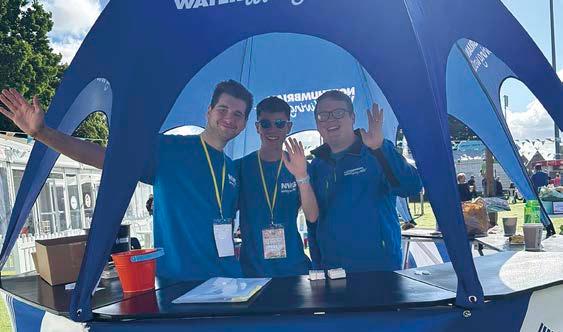
to help overcome a number of different challenges, which include reducing leakage and the reliance on the use of storm overflows.
They are off to a promising start, and will continue Northumbrian Water’s successful track record for developing revolutionary projects.
Most of the ideas developed originate at Northumbrian Water’s award-winning annual Innovation Festival.
Planning is now taking place for the eighth iteration of the huge event, which sees crowds of thousands gather at Newcastle Racecourse, and it has boasted some world-famous solutions that are making a real-life impact to customers every day.
The most renowned is the National Underground Asset Register, also known as NUAR.
The idea was developed at the festival in 2017, and was simply to create a map of the pipes, wires and cables hidden in the ground, with the main aim of keeping workers safe by preventing utility strikes.
Thanks to the collaboration with lots of different partners, hard work and a lot of testing in between, the real-life, digital underground map was officially launched last year across areas of England and Wales by the Government’s Geospatial Commission.
From a small festival tent in Gosforth, NUAR is now in service in the North East, London and Wales, with the plan to roll it out nationally.
Once it is fully operational everywhere, it is expected to deliver at least £350 million per year of economic growth through increased efficiency, reduced asset strikes and reduced disruptions for people and businesses.
Not only that, but it will also help to make digging safe for all utility workers.
But, thanks to yet another innovative project, digging is now not always even strictly necessary.
The No Dig project, also a poster child of the Innovation Festival, is now being used by water workers across the North East, freeing up traffic and road closures.
The solution, which is a food-grade, mineral-like substance, alleviates the need for teams to dig holes in roads by being injected into the pipe and healing it from the inside out.
It also means customers are likely to notice less of an impact on their water supply, as the fix is much more time efficient.
And it’s not just under the ground where Northumbrian Water’s innovative work is taking place – it’s up in the skies too.
In January, a world-first trial on water quality monitoring using drone technology took place in the North East.
The drones are used to take water quality samples in areas difficult for staff to manually reach, and will help make monitoring of the region’s waterways much more efficient.
They will also help reduce the company’s carbon footprint, and will provide the water company with more data over a larger area, with much faster results.
With more frequent and detailed monitoring, researchers also hope this will mean once the monitoring programme is in place, local water quality results can be made available to the public, in near real-time.
Angela MacOscar, who heads up the water company’s innovation team, says this is only the start of what can be achieved with innovation within the sector.
She says: “We love innovation and, at Northumbrian Water, it’s everywhere – it’s everything that we strive to keep doing for our customers, who are ultimately at the heart of our business.
“Innovation is crucial to our success, and solving some of the biggest challenges we have – not just as a company, but globally – is so important in making our services the best they can be.
“Among the business, there are some of the best, most creative and most innovative people I have ever come across, and they are always full of fantastic suggestions and ideas.
“The passion they have for improving their

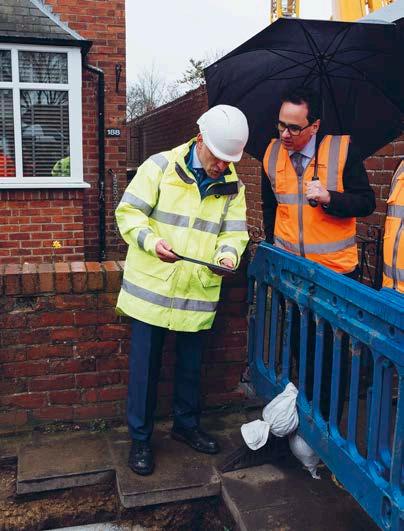
communities is outstanding.
“That’s why we will continue to focus on developing our innovation pipeline, to make a real difference to the region we love.”
For more information about Melius Cyber, and how it could help your business stay safe against online criminal attacks, contact 0191 249 3003.
When Newton Aycliffe-headquartered Crafter’s Companion sought to bolster its online defences, it turned to Melius Cyber. Here, David McPherson, chief technology officer at the Newcastle-based firm, explains how it supported the popular hobbyist business and why all organisations – regardless of size or sector – must prioritise cybersecurity.
www.meliuscyber.com
cybersafe@meliuscyber.com
Household name Sara Davies founded Crafter’s Companion during her time as a student at the University of York.
Her vision started with the creation of the Enveloper; an innovative product that exploded in popularity once entering the market.
From those beginnings, the business now has two physical stores, a massively successful online operation, more than 200 staff and revenues in excess of £35 million.
It offers an extensive range of crafting products in-store and online, and also provides educational crafting content across multiple digital platforms.
As a responsible business and employer, with an emphasis on e-commerce, the company holds large amounts of data and carries out thousands of online transactions per week.
Therefore, the security of its technology was key to the business and critical to any growth plans.
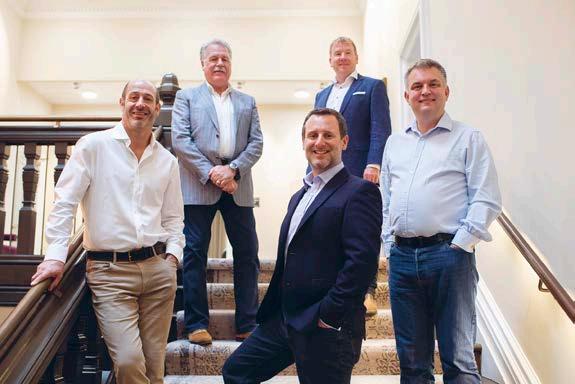
Anticipating a period of further growth, Crafter’s Companion recognised an essential component of its strategic growth plan must include reinforcing and continuously improving its cybersecurity –keeping itself, its supply chain and, fundamentally, its customers safe.
A key part of this strategy was to obtain security certifications in the recognised standards of Cyber Essentials Plus and ISO/IEC 27001 – these UK and international standards ensure organisations keep on top of their information security while demonstrating to supply chains and other business stakeholders they operate with good cybersecurity posture.
After a competitive selection process, Crafter’s Companion chose Melius Cyber as its partner to improve cyber systems and obtain the relevant certifications.
One of the initial steps was to build on the penetration testing Crafter’s Companion already regularly completed, by extending the scope and using external expert testers that simulate an ethical hacker attempting to breach its system.
As the professional tester conducting this exercise had no prior knowledge of Crafter’s Companion’s infrastructure, it made the simulation all the more realistic, with a ‘no stone going unturned’ simulated hack.
As a result, a comprehensive report identifying areas of vulnerability – and categorised by level of severity recommended remediation suggestions –provided a foundation to enable it to make the move towards security certifications.
Conscious this type of traditional penetration testing only allows for a one-off, point-in-time view of cybersecurity standing, Crafter’s Companion wanted constant visibility of potential vulnerabilities and

possible threats, not just during times when it was undertaking penetration testing.
This led to the discovery of Cyber Safe, an affordable SaaS designed for the SME marketplace, which scans infrastructure daily and identifies areas of vulnerability.
Cyber Safe reports using a simple dashboard, highlighted by severity and risk to business.
This allows Crafter’s Companion to keep on top of its remediation activities and ensure they remain secure.
An added benefit is that Cyber Safe is aligned with the key security controls within Cyber Essentials Plus, making the move towards certification an easier and less resource intensive process, as most of the hard work has been completed and the business now has risk assessment data at its fingertips.
David McPherson, Melius Cyber’s chief technology officer, says: “The project brief was quite extensive, and, for a large organisation, they already had a lot of good practices in place.
“Initially, we worked to improve on the periodic penetration testing, building up a backdrop of the overall IT estate and its resilience and weak points.
“From there, we deployed our own expertise and the Cyber Safe platform.
“The work we have completed will improve the company’s security and make the completion of the required certificates much simpler.”
For many, cybersecurity is little more than a buzz word.
But it essentially boils down to having the right protection in place to keep out the growing number of unwanted threats or attacks.
Each year, the number of known threats increases by around 25,000.
Simply putting in place a few measures is no longer stringent enough to keep you safe year-on-year.
Now is the time for businesses to invest in securing their future and seek out expert help.
Because, at the end of the day, can you afford not to?
From small beginnings, EMG Solicitors has grown into an eminent legal firm across the North East, Cumbria and North West. And as it celebrates its tenth anniversary, co-founders Emma Gaudern and Jemma Morland reflect on the last decade while looking forward to future growth, which they say will be underpinned by the client focus and community impact instilled at its foundation.
www.emgsolicitors.com
@EMGSolicitors
For more information about EMG Solicitors and its services, call 0191 500 6989.
Imagining a law firm is exactly what lawyers Emma Gaudern and Jemma Morland did back in 2014.
Their vision was to create a law firm that would make a positive difference to people’s lives – to the lives of its clients, colleagues and their local communities.
Ten years later, EMG Solicitors has come a long way since the duo first put their heads together and imagined their ideal law firm, which, as Emma affectionately refers, would create a new way of working with a fresh approach and be a place of joyful employment.
And the business has followed through on that vision, seeing incredible growth and, most importantly, making a positive impact on those it works with.
Values that very much remain at its heart.
Investing in local communities
With a headcount of 148 and premises in Durham, Penrith, Newcastle, Darlington and Manchester, the business also has plans for further expansion in the South after the recent appointment of its 11th director Rebecca Sparrow.
Alongside supporting clients with legal services including wills, trusts and probate, family, dispute resolution, residential conveyancing, commercial property and its specialism in Court of Protection (COP), the team also devotes time to raising muchneeded funds for local communities.
Every year, the firm donates five per cent of company profits through the EMG Community Fund, providing charitable grants to organisations including Newcastle Women’s Aid, Durham City Youth Project and the Walk & Talk Trust, to name just a few.
Added to that are the fundraising efforts of the annual WonderLAN charity ball, which has amassed an impressive £100,000 for Headway, the brain injury association.
A team that makes a difference to clients’ lives
True to Emma and Jemma’s original vision, EMG Solicitors takes pride in making a real difference to clients’ lives, whether that’s helping them buy their first home or offering advice on planning for their family’s future.
And with their specialist knowledge of COP law, they provide the support, or ‘scaffolding’, around clients who don’t have capacity to make important financial or welfare decisions for themselves.
Placing a huge value on family, EMG Solicitors cares passionately about the community, and specialising in these sectors means it sees first-hand some of the fantastic work done by charities and community groups.
It was one of the reasons the firm set up its own fund with County Durham Community Foundation.
Managing director Emma believes it’s the company’s positive culture and desire to proactively nurture talent that are just some of the reasons it has been so successful at delivering a positive experience for clients and people.
She says: “From the start, we had a clear vision of creating an environment where our people could really thrive and deliver the very best service to our clients, and I’m proud to say we have achieved just that.
“It’s been an incredible ten years, and personal

highlights include seeing our COP team and total number of colleagues grow significantly.
“To think we are now a team of 148, with a national client offering, is just incredible.
“The opening of the Manchester office also has a special place in my heart.
“Being a Mancunian, I always had a dream of opening an office there, so making that a reality has been very special.
“None of this, of course, would be possible without the talented people we have working here, and I would like to thank each and every one of them.”
EMG has marked several milestones in recent years, which include being named as a tier one law firm for its personal tax, trust and probate work in the Legal 500 rankings, and Emma ranked a ‘leading individual’ by the trusted industry directory.
In 2022, the firm also won the 'UK Employer of the Year: Silver' at the national Investors in People Awards, and the CIPD North East of England Excellence in Leadership Award.
Jemma, EMG Solicitors’ director and co-founder, says: “It really has been an incredible journey so far.
“The last ten years have brought some wonderful people into our lives; clients, colleagues and professional partners.
“I sometimes have to pinch myself to think about how far we have come since Emma and I founded the company.

Watch EMG Solicitors’ ‘Imagine A Law Firm’ video here
“I still vividly remember that first day in February 2014, and being armed with power tools to put up the furniture and a pot plant that was kindly gifted from my mum, who optimistically set us the challenge of keeping it alive as long as the business.
“Sadly, while EMG goes from strength-to-strength, I can’t quite say the same for the shrub in question. Sorry mum!”
As the firm marks its tenth anniversary, it also records a 30 per cent increase in turnover, as well as a 55 per cent increase in team members in the last 12 months.
It has also expanded its team of COP specialists to 51. However, the firm is determined this growth won’t change the values so central to its work.
Ian Burke, head of people and culture, adds: “Our core values of co-operation, courage, excellence, integrity and kindness are central to how we relate to both our colleagues and our clients.
“When you get culture and engagement right, it’s amazing what can be achieved in a business.
“This year, our key focus is to identify how our processes align with our core values, and to infuse these into our client experience.
“As we grow, providing the best possible service to our clients and making a positive difference to our local communities will remain our priorities.
“These values will be with us for our next ten years and beyond.”
Host & Stay
If you’re looking to reduce the stress of selfmanagement or maximise your income in Northumberland, contact Host & Stay on 01287 658171.
In recent years, the concept of owning a holiday home has evolved beyond a personal retreat. On the contrary, it has become a profitable investment opportunity. And as property owners seek to capitalise on the growing holiday rental market, the need for efficient management solutions has never been greater.
www.hostandstay.co.uk/host
LinkedIn: Host & Stay
Host & Stay is the fastest-growing, family-owned holiday home management business in the UK right now.
Whether you already own an existing holiday home or you’re looking to enter the short-term holiday let market, Host & Stay offers the most comprehensive fullymanaged service in the North of England.
With a focus on maximising income while reducing the stress of self-management, Host & Stay offers new methods for new times.
Host & Stay’s success lies in its commitment to exceptional service, meticulous property management and strategic marketing initiatives.
Recognising each property is unique, its experienced team works closely with property owners to tailor management solutions that suit their individual needs.
Whether it is completing changeovers, co-ordinating maintenance jobs or communicating with guests, Host & Stay provides peace of mind, allowing owners to reap the rewards of their investments for only a ten per cent plus VAT management fee.
Central to Host & Stay's modern approach is the utilisation of professional, editorial photography, 3D tours and compelling property descriptions.
Host & Stay's team of skilled photographers and


copywriters ensure holiday homes stand out from the crowd.
Host & Stay effectively reaches a wide audience of potential guests to drive bookings and optimise occupancy rates throughout the year, with its extensive network including 60 global platforms.
As well as digital marketing, Host & Stay strategically leverages partnerships with local businesses.
Thinking of holiday letting in Northumberland?
With its striking scenery, stunning coastline and historical attractions, it’s no surprise Northumberland is a popular tourist destination attracting guests all yearround.
Northumberland's popularity translates into robust rental yields for holiday let properties.
With rental yields ranging from ten per cent to 15 per cent, investors can stand to reap significant financial rewards.
And, unlike traditional buy-to-let properties, which often experience periods of vacancy, holiday lets in Northumberland have the potential to generate steady income throughout the year.
Investors can also benefit from the potential for capital appreciation, while investing in a Northumberland holiday let can also offer tax advantages compared to traditional buy-to-let properties.



Nestled in the basement of Newcastle’s Cloth Market lies Mother Mercy, a cocktail bar that blends the meticulous professionalism of a five-star hotel with the charm and characteristics of a traditional Geordie watering hole.
These components aren’t by chance.
Moreover, they are testament to the remarkable career of co-founder Neil Donachie.
Words by Kate HewisonFrom a young age, Neil had a passion for music and creativity, and after living in Manchester with his band in his late teens, the Durham native moved back to the North East and studied music at Newcastle University.

During this time, he secured a parttime job at Popolo, on Newcastle’s Pilgrim Street, and was introduced to the dynamic world of hospitality.
He says: “It’s really similar to a lot of the reasons why I enjoyed music.
“It was lively, it was active, we were having a good time, it was creative.
“It didn't feel like a nine-to-five in any way.”





www.mothermercy.co.uk
Coming to the end of his degree, an opportunity to work at The Savoy, in London, came up through a friend and past colleague at Popolo.
After numerous interviews, Neil started at the bottom, polishing glasses and learning from the best.


“WE’RE MUCH LIQUID RESTAURANT WE ARE
During his time at The Savoy, he worked his way up to senior bartender, and was part of the team when they won ‘Best Hotel Bar in the World’.
He says: “It was one of the biggest periods of professional development in my life.
“You're surrounded by a big international team, all people that were there for the same reason, which was to learn and be the best.


“The culture was a rigorous focus on quality and professionalism.”
After nearly four years at The Savoy, Neil moved back to the North East.
He worked across the region, most notably as bar manager at Michelin-star restaurant House of Tides and brand manager at Fentimans.
It was his experience across the industry, from managerial to operations, marketing and the support of co-founder Luke Comer, that made Neil realise he needed to take the next step in his career.


That next step was Mother Mercy.
With a passion for creativity and a dream of curating spaces, Neil knew there was a gap in the market for a table service-led cocktail bar in Newcastle.
Since its inception in November 2019, Mother Mercy has enjoyed rapid growth, huge award wins and has since opened sister venue Café Mercy and expanded into Fenwick.
Even after lockdowns and roadblocks in the industry, the brand is going from strength-to-strength.
Neil says: “We try to be ruthlessly focused on the consistency of our recipes.

“We’re much more like a liquid restaurant than we are a bar, and guests notice these things.
“We apply Michelin star and five-star hotel service techniques to a basement.” From freshly squeezed juice and frozen glasses to a commitment to excellent service, the team at Mother Mercy have an unwavering dedication to quality – a simple characteristic that has been a recurring motif within Neil’s extraordinary career and undoubtedly plays a key part in Mother Mercy’s success.
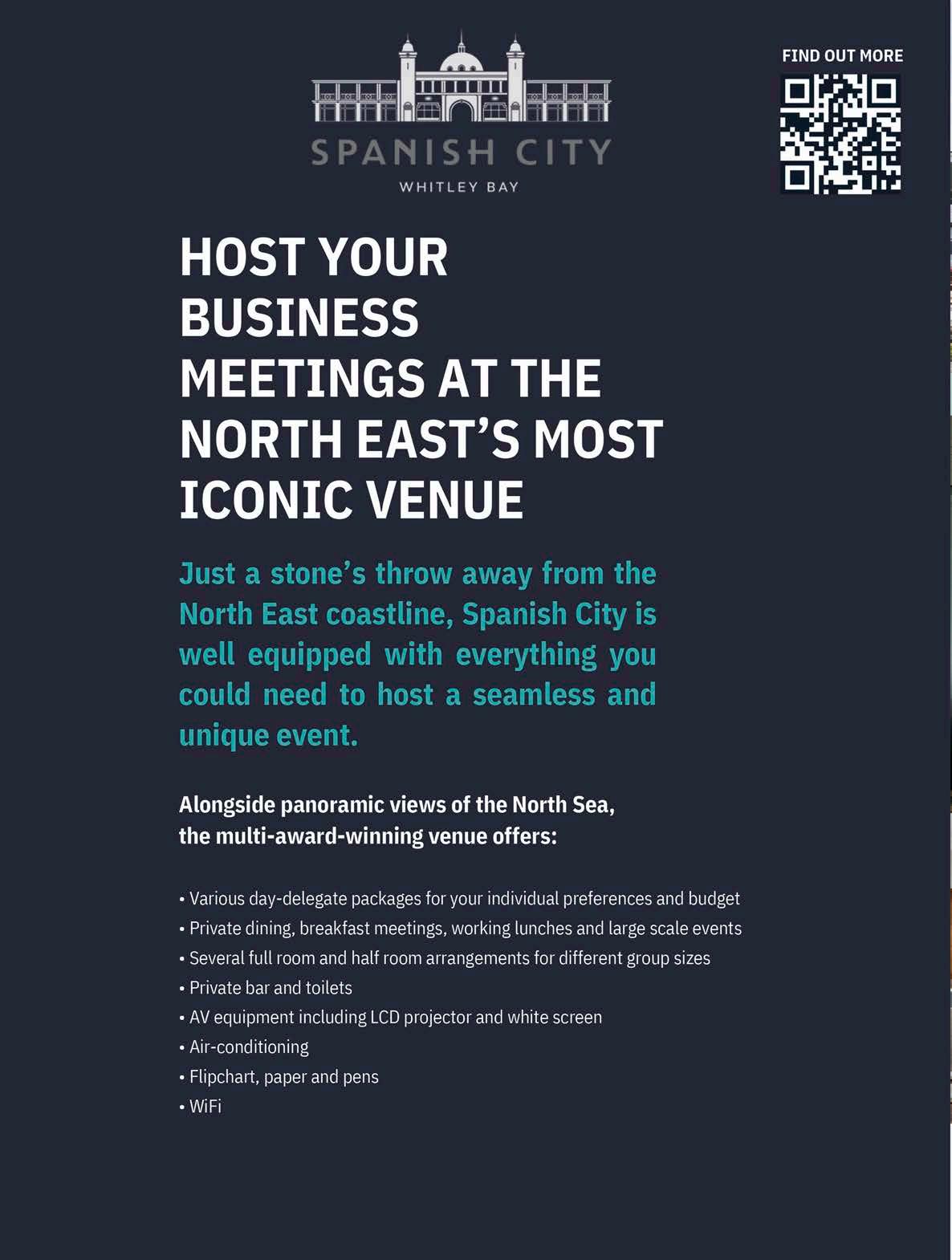
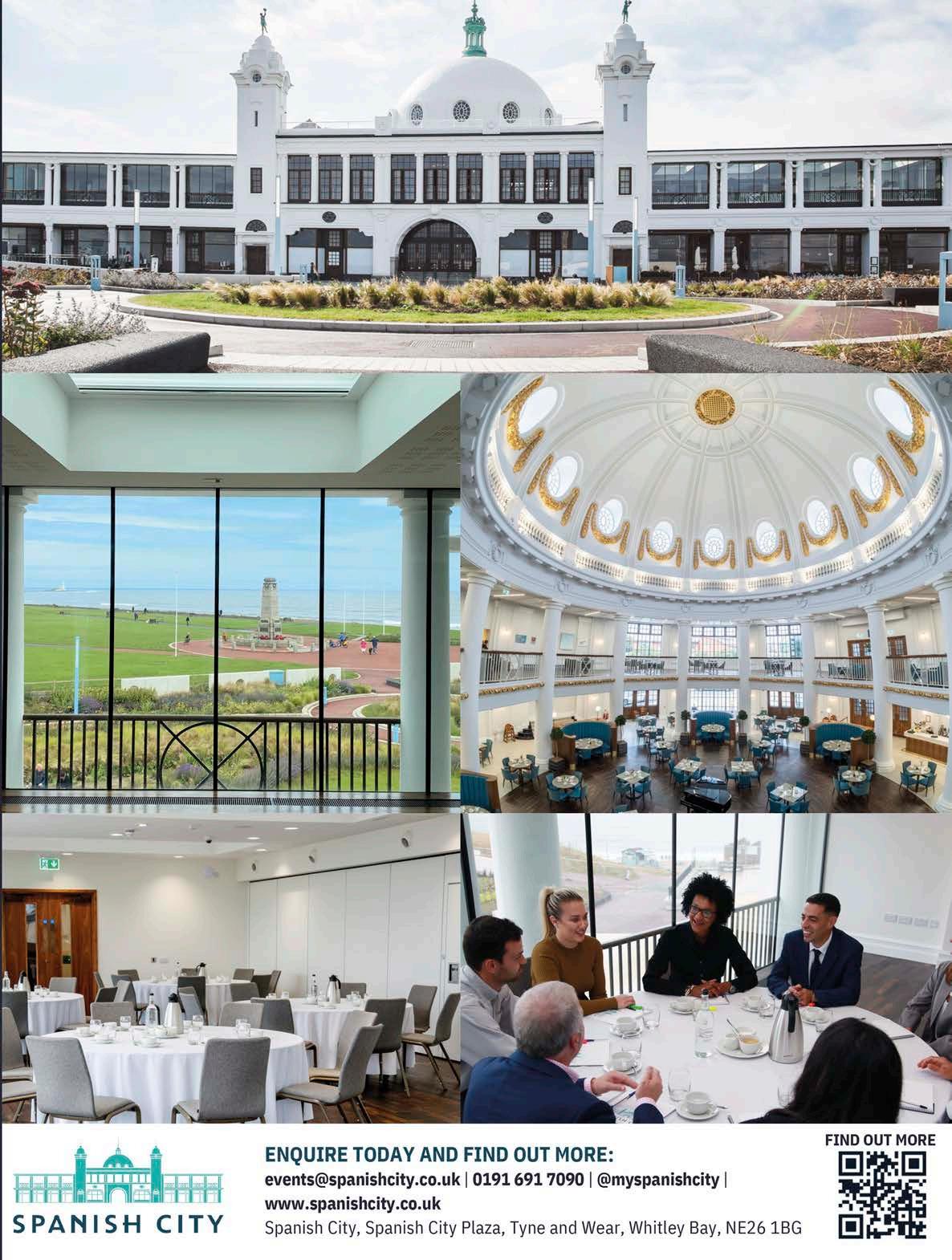
Aon -
For more information on Aon’s Global Risk Management Survey, and to view its latest findings, visit www. aon.com/2023-globalrisk-managementsurvey/unitedkingdom
Alternatively, to learn more about how the firm’s Newcastle and Stockton teams could help your business on areas including commercial risk, workplace health, reinsurance and wealth solutions, contact 0191 220 3333 or 01642 659300.
Taking proactive steps to mitigate risk is fundamental to the future of any business. And, through its flagship Global Risk Management Survey, Aon is helping many companies do just that. Here, Steven Hugill speaks to Christine Wood, the professional services firm’s head of North East and Cumbria, to learn more about the report and its influence on strengthening businesses risk profiles.
www.aon.com
@Aon_UK
Running a business can be tough.
As sure as night follows day, risk remains a relentless foe, a constant bump in the operational road map.
What, though, if there was a blueprint that existed to address such a challenge while offering the sanctuary of expert guidance?
One that acted as a metaphorical arm around organisations’ shoulders, which combed bosses’ existing and future risk concerns before untangling the knots into threads of actionable data?
Well, there is.
Now into its ninth iteration, Aon’s flagship Global Risk Management Survey does just that.
Harnessing business leaders’ thoughts against ongoing geopolitical and macroeconomic volatility,
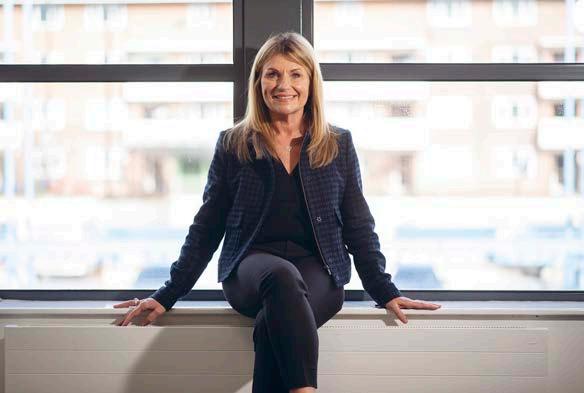
the professional services firm’s biannual report highlights the business and human threats afflicting firms across a multitude of sectors.
“We’re always trying to be on the front foot when it comes to acting on the issues keeping our clients awake at night,” says Christine Wood, who oversees Aon’s Newcastle and Stockton offices as head of North East and Cumbria.
“And the survey is a great enabler for us to do just that.
“The business world is constantly changing, so by understanding what organisations are seeing and thinking, and variations to the landscape that may raise their vulnerability, we’re able to deploy our resources and better help them mitigate risk.
“Ultimately, the survey means we’re able to stand two or three steps ahead of clients, to challenge them on issues, which ensures they’re best prepared for today’s risks and those that will come tomorrow.”
According to Aon’s latest report, those threats are headlined by cybercrime, with online fraudsters held up as the biggest worry across both current and future operations.
And while organisations are increasingly acknowledging the dangers of being caught in hackers’ sights, Christine says businesses must match their awareness with meaningful action and, in cases, shift mindsets to cyberattacks being a physical entity, rather than a seemingly ethereal concept.
She says: “Cyberattacks are one of the biggest risks facing businesses in the UK today, with criminals becoming ever more sophisticated.
“And while increasing numbers of businesses and
boards are strengthening online security – we’re receiving more requests to deliver simulation and quantification exercises, to help firms understand potential maximum losses, for example – the intangibility of an attack remains a big danger.
“If we see a building go up in flames or stand underwater, we can easily visualise the long-term effects on a business, from its immediate ability to trade to aspects such as its brand and reputation.
“It’s exactly the same with a cyberattack.
“Although you can’t see the damage in the same overt way, hackers are still able to similarly immobilise a business.
“Furthermore, although awareness is constantly rising, there remains a feeling among some businesses who often don’t recognise how digitally dependent they are.
“But if a business has data, such as employee data and invoices, then it is absolutely at risk of being targeted.”
Further current risks identified include skill shortages, which rank second, and cashflow and liquidity concerns, which are a new entry at number eight.
Christine says: “Attracting and retaining talent is a big risk for any business, and being so high on the list only reflects the difficult picture at present.
“It is very challenging for all sectors; we want the best staff, yet many businesses find it tough to pay rising salaries to attract and then retain skill.
“Without the best people, companies will find it more difficult to be as innovative as possible, which means growth is therefore more of a challenge.
“It’s a similar situation with cashflow and liquidity; rising costs of living, impacted by higher inflation and interest rates, represent a sizeable risk and bring considerable additional pressure.”
Both also feature in the survey’s future risks list, as do artificial intelligence and climate change, with Christine highlighting the latter as a salient example of the report’s proactive power.
She says: “The volatile climate can hugely affect organisations – we only need to look at the storms at the start of the year.
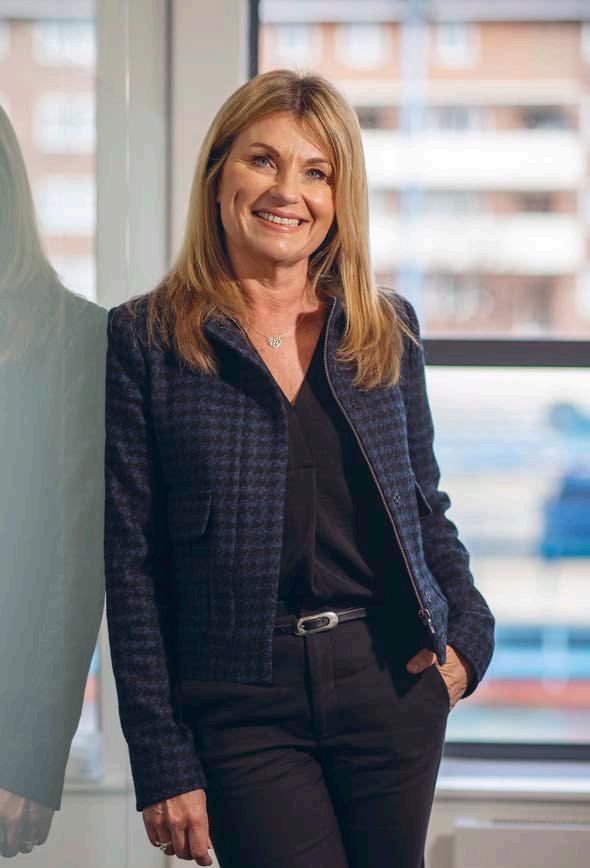
“And with exceptional weather events becoming increasingly frequent, they are a risk we must consider more.”
“That is where the survey – and our support –comes in,” adds Christine.
“By understanding businesses and changing concerns, we’re able to connect, through our North East client service teams, to a vast pool of experts covering multiple sectors.
“Ultimately, we’re acting as clients’ eyes and ears in the marketplace, giving them the best possible advice and helping them make more informed decisions about risk in increasingly volatile times.”
In a world of commercial challenges and opportunities, Durham Business Growth is providing firms with tailored support that delivers not just stability but a platform to unlock potential and foster sustainable growth. Here, leading figures from delivery partners Business Durham, RTC North and UMi explain more about its aims and objectives.
www.durhambusinessgrowth.co.uk
www.businessdurham.co.uk
@_BusinessDurham
For more information on how Durham Business Growth could help your organisation, call 0191 716 1006.
To learn more about Business Durham, call 03000 261 261.
Tailored support for County Durham businesses
In the dynamic landscape of County Durham's commercial environment, businesses encounter a constantly shifting array of challenges and opportunities.
Recognising the need for comprehensive support, Durham Business Growth has emerged as a driving force, offering a transformative platform providing tailored support, unlocking potential and fostering sustainable growth.
The Durham Business Growth programme, funded by Durham County Council with a budget of £8.16 million, brings together the expertise of Business Durham, RTC North and UMi.
This collaborative effort provides a simplified and accessible platform for businesses.
Funded by the UK Shared Prosperity Fund, through the Department for Levelling Up, Housing and Communities, the programme's primary objective is to strengthen the county's economy.
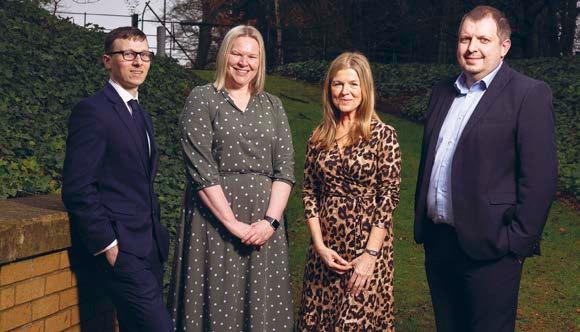
It is open to businesses of all sizes and sectors, with a strategic emphasis on those operating in growing sectors including the green economy, decarbonisation, space and satellites, fintech and digital, advanced material electronics, life sciences and the creative and cultural sectors.
Business Durham: A trusted guide for business success
As the lead partner in Durham Business Growth, Business Durham, the business support service for Durham County Council, is spearheading the initiative.
With a mission to deliver more and better jobs, while fostering a strong competitive economy, Business Durham is a knowledgeable and trusted guide for businesses seeking funding, advice and networks to thrive in the county.
The Business Durham team, including five dedicated business engagement officers, actively works with businesses, providing localised support and fostering connections vital for growth.
These officers are go-to contacts for businesses throughout their engagement with the Durham Business Growth programme.
Serving as trusted advisors, they support businesses in uncovering their growth potential, aligning interventions with action plans and offering continuous support.
Specialised productivity and growth support with RTC North
RTC North stands at the forefront of business support and innovation, bringing a wealth of expertise to the
Durham Business Growth initiative.
Through its productivity and growth support, businesses can access a spectrum of services, ranging from one-on-one consultations to seminars and workshops.
The dedicated team of productivity and growth advisors works closely with Durham businesses, focusing on enhancing specific areas to boost productivity and increase the likelihood of achieving growth ambitions.
With a commitment to excellence, RTC North plays a pivotal role in connecting businesses with the right resources, ensuring they overcome challenges and seize opportunities in an ever-evolving marketplace.
Their involvement in the Durham Business Growth programme is testament to their dedication to unlocking the potential of organisations and driving sustainable growth.
UMi: Tailored grants and expert funding guidance
UMi brings a unique blend of rigour and creativity to the Durham Business Growth initiative.
With a history of collaboration alongside governments, charities, corporates, universities and more, UMi stands as a beacon of responsible business ethics and standards.
The Durham Business Growth comprehensive grants programme, managed by UMi, provides businesses with access to a capital fund of £3.3 million, offering grants from £10,000 to £200,000.
Additionally, a revenue fund of £700,000 supports grants ranging from £1000 to £10,000 for specialist consultancy.
UMi's business funding adviser role ensures businesses receive the guidance needed to secure funding, polish project plans and make grant applications shine, drawing on UMi's extensive knowledge of successful grant funding strategies.
Sarah Slaven, Business Durham managing director, says: “We understand that each business is unique, and Durham Business Growth is dedicated to building support around each company to ensure they receive the best possible tailored support for their individual needs.
“This is achieved through a fantastic mix of support from the programme, including capital grants, revenue grants, one-to-one support and one-to-many support, tailored to businesses irrespective of their sector.
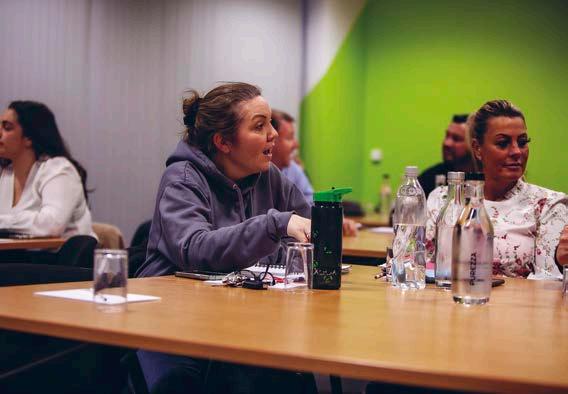
“The strength of support from the three partners, Business Durham, RTC North and UMi, lies in our breadth and depth of knowledge and experience, providing a wealth of expertise to the initiative.”
Nicki Clark, UMi chief executive, says: “County Durham has incredible potential, which the Durham Business Growth programme is focused on maximising.
“At UMi, we have one purpose, which is to use the best information, expertise and finance to help businesses go further.
“We are really excited to continue our long-standing relationship with Business Durham and Durham County Council, and play an active role in helping businesses maximise their potential right across the county.”
John Heslop, of RTC North, adds: “RTC North is delighted and enthused to be a partner alongside UMi in supporting Business Durham with this exciting and innovative programme developed for businesses across County Durham.
“Collectively, we will bring a wealth of experience, guidance and know-how to help businesses with their own improvement and growth ambitions.”
Durham Business Growth is testament to the power of collaboration and strategic partnerships.
Business Durham, RTC North and UMi have come together with a shared goal of driving economic prosperity in County Durham.
Through tailored support, grants and a commitment to excellence, these delivery partners are paving the way for businesses to thrive, grow and contribute to the region's success.
-
For more information about Raymond James, Monument, and how its expert team could help map your financial future, email RJUK-Monument@ RaymondJames.com or call 0191 303 4260.
Some of the information used in this article was sourced from the Charles Stanley Market Outlook 2024.
Any opinion or forecast reflects the judgment as at the date of issue and is subject to change without notice. Past performance is not a reliable indicator of future results. This commentary is intended for information purposes only and no action should be taken, or refrained from being taken, as a consequence without consulting a suitably qualified and regulated person.
With investing, your capital is at risk.
2023 turned out to be a good year for equity markets, despite the challenges posed by a mini US banking crisis, above target inflation and interest rates at pre-Great Financial Crisis levels. And markets are looking beyond the present to hopefully better times, not least the prospect of interest rate cuts in developed economies and the continued impact of artificial intelligence. Here, Gary Fawcett, branch principal at Newcastle-based wealth manager Raymond James, Monument, looks at the likely key themes for the year ahead.
www.monument.raymondjames.uk.com
LinkedIn:
Raymond James MonumentTechnology stocks were the star performers during 2023 with the Magnificent Seven – Alphabet, Amazon, Apple, Meta Platforms, Microsoft, Nvidia and Tesla – accounting for about 80 per cent of the eventual rise in the S&P 500, propelling the US benchmark index to an all-time high.
However, the benefit to share prices could be seen far wider, as many companies embraced artificial intelligence (AI) to help generate additional services and cost benefits.
Relx, Experian, Prudential and some of the world’s largest healthcare companies are examples of organisations investing further into AI technologies.
And there is no doubt AI will continue to be a much-watched theme this year.
While some of the largest companies in the world have been the main driver of returns over many years, the opportunity for global smaller companies looks increasingly interesting.
Despite smaller companies outperforming their larger counterparts over the past 25 years, the valuation difference between them has widened, creating an entry point that looks to offer attractive long-term returns for patient investors.
Ultimately, valuations do matter, and this part of the market is often under researched, which creates opportunities, with smaller companies being able to react more quickly, grow more rapidly and potentially become tomorrow’s winners.
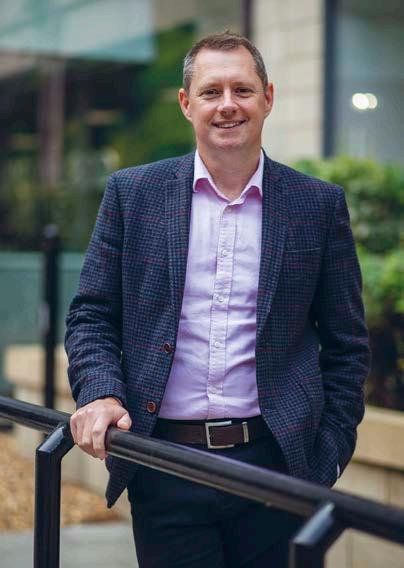
There is no doubt the downward trajectory of inflation is much welcome, with three of the four components of inflation – energy, food and core goods – being supportive.
However, the largest component – services – is proving trickier.
Services are very much linked with consumer
spending (which accounts for 64 per cent and 69 per cent of the UK and US economy, respectively), that in turn is supported by job security, rising real incomes, savings levels, overall wealth and access to debt.
However, discretionary spending by consumers is impacted by living expenses, spending on essentials and taxes.
While the impact of interest rate rises is yet to be fully felt, due to many borrowers being on fixed-rate mortgages, a significant number of UK households will need to re-mortgage this year, which will affect the ability for those consumers to spend at the current rate.
Coupled with a likely uptick in the unemployment rate, as companies seek to cut costs, this is likely to result in a challenging environment for some.
Saying that, some consumers are seeing a boost to their spending ability, with higher interest rates on savings.
The US consumer looks to be in a better position, but the economy is still likely to see an increase in the unemployment rate.
This paints a mixed picture for the outlook around consumer spending, which could lead to inflation remaining slightly higher than anticipated by markets.
The outlook for investment markets will continue to be choppy and very much driven by expectations on interest rate cuts this year, on which the market is pricing in around 125 bps of cuts in the US and 50 bps in the UK by the year end.
Whether this will come to fruition will depend on how sticky inflation proves to be.
Both equity markets and longer dated bonds have benefited over the past few months from the likely peak in interest rates in developed economies.
Bond markets could prove more volatile should inflation remain elevated, but even at current levels, Government bonds offer attractive longer term returns compared with more recent times.
A tailwind for bond markets could be the $7 trillion invested in global money market funds, some of which is likely to find a new home as interest rates start to fall.
Bonds could be a beneficiary.

2024 will be a busy year for elections, with voters going to the polls in Russia (March), India (April and May), the European Parliament (June), the US (November) and the UK, the latter on a date yet to be confirmed.
However, voters shouldn’t expect many giveaways on either side of the Atlantic, as the coffers are fairly bare, with continued deficits being funded by further bond issuance, but at higher rates.
This vicious circle will make it difficult for largescale fiscal stimulus over the years ahead.
During 2024, investment markets will need to navigate the negative impact on lower company profits as economies slow, but will be influenced by movements in interest rates as central bankers at home and overseas look to engineer a hopeful soft landing and avoid a recession.
As always, there will be winners and losers, and no doubt too the odd surprise that investors will need to deal with.
Lucy May is head of inclusion and culture at Newcastle-based engineering and design
consultancy Cundall. Here, she tells Steven Hugill about her position, the value of diversity in the workplace and how she balances her role with time as an elite football referee.

4You are head of inclusion and culture at Cundall. What does your role involve, and what does a typical day and week look like?
My focus is on shaping and embedding sustainable and meaningful change.
As with any global business, it’s important to create a positive and supportive environment for all our colleagues, whoever and wherever they are, and it’s vital regional and local contexts are reflected in our plans, policies and communications too.
My day starts with walking my dogs, followed by a training session – as part of my parallel career as a football referee – set by our Professional Game Match Officials Limited sports scientist.
There is no typical day at work, and that’s something I love.
I have a mix of meetings with people across the business, and have always loved the people aspect – it’s important to engage with colleagues, so I can better understand their needs.
After work, there’s another walk with a podcast, and I see what’s outstanding for football, which includes e-learning, reviewing clips or meeting my coach.
As your position attests, great strides are being taken to improve – and increase – equity in the workplace. Just how important is it for businesses to ensure balance across their workforces? What benefits do they, and their employees, gain from such change?
www.cundall.com
Extensive research demonstrates the value a diverse workforce brings – from increased efficiency and problem solving to innovation and engagement.
Recruiting a diverse team is great, but retaining that team is paramount, and only an inclusive culture will ensure that.
Moreover, businesses should be doing it because it is the right thing to do.
Having barriers to certain groups leads to teams who all look and sound like each other, with no diversity of perspective.
You are very experienced in the sphere, having previously rolled out a diversity, equality and inclusion strategy at Newcastle United, as the club’s head of inclusion, which ensured it met strict Premier League guidelines. What did that entail? Internally, my work included creating our annual equality monitoring reports, people policies and working to create meaningful learning opportunities for employees.
Externally, my work included making St James’ Park as accessible as possible.
I also created the Memory Café, for those living with dementia and Alzheimer’s disease.
This was encompassed by the brand ‘United as One’, which I am hugely proud of. I still smile when I see it being used.
Staying with football, you accompany your Cundall role with time as a referee, with your CV including numerous Women's Super League matches and position as fourth official during the 2016 Women’s FA Cup Final. How did your journey in the sport begin?
I used to watch my brother play football. Each week, his team would struggle for someone to run the line, the flag passed around the dads like a hot potato.
So, I took it up. There were some tense journeys home but, overall, I enjoyed it.
I ran the line one day for Iain Thomson, who was a referee tutor.
He was starting a course that week and encouraged me to attend.
I have never felt as nervous walking into a room as I did that night at the Co-Op Club, in Portsmouth, but I braved it and never looked back.
Are there any complementary elements of your careers? Are you able to transfer skills and learnings
from one to the other?
Both football and engineering have traditionally been seen as male-dominated environments, but are transforming to encourage and embrace more diversity, so there are many crossovers.
The success of the Lionesses has played a huge part in raising the profile – and participation – in women’s football.
It’s the same with refereeing. I’m proud to have played a part in it becoming ‘the norm’ to have females officiating, not just at women’s matches but men’s too.
We’re breaking down prejudices and barriers while, hopefully, making it easier for the next generation of girls on the pitch and in the workplace.
Inclusion is about anyone being able to feel they belong and be valued for who they are and what they can contribute.
As they say, ‘if you can see it, you can be it’, and here at Cundall we’re raising the profile of diverse role models at all levels in all our locations.
It’s also about allyship and activism, standing up and being counted, and supporting those around you.
And it’s about diversity within the team.
Eleven world-class defenders might not concede goals, but they’re unlikely to score many, either.
As in the workplace, it’s about creating a culture where everyone feels valued and, in turn, values the role of every other person in that team.
We need to have that diversity of thought and specialism, and the autonomy to believe that, while we are great at what we do as individuals, together we are stronger.
And finally, as a North East referee, how proud were you to see fellow regional official Rebecca Welch make history late last year, when she became the first female to oversee a men’s Premier League game?
It was a historic day for Rebecca and all officials in the game.
Refereeing is a meritocracy, with roles awarded based on ability and achievement, rather than gender.
It’s the way it should be, and I’m proud to be part of that.
To see Rebecca, as well as Kirsty Dowle and Emily Carney, receive appointments across various levels of the game was a great end to 2023.
One day, a woman officiating at any level won’t raise an eyebrow, and that’s when we’ll know we’ve really achieved change.
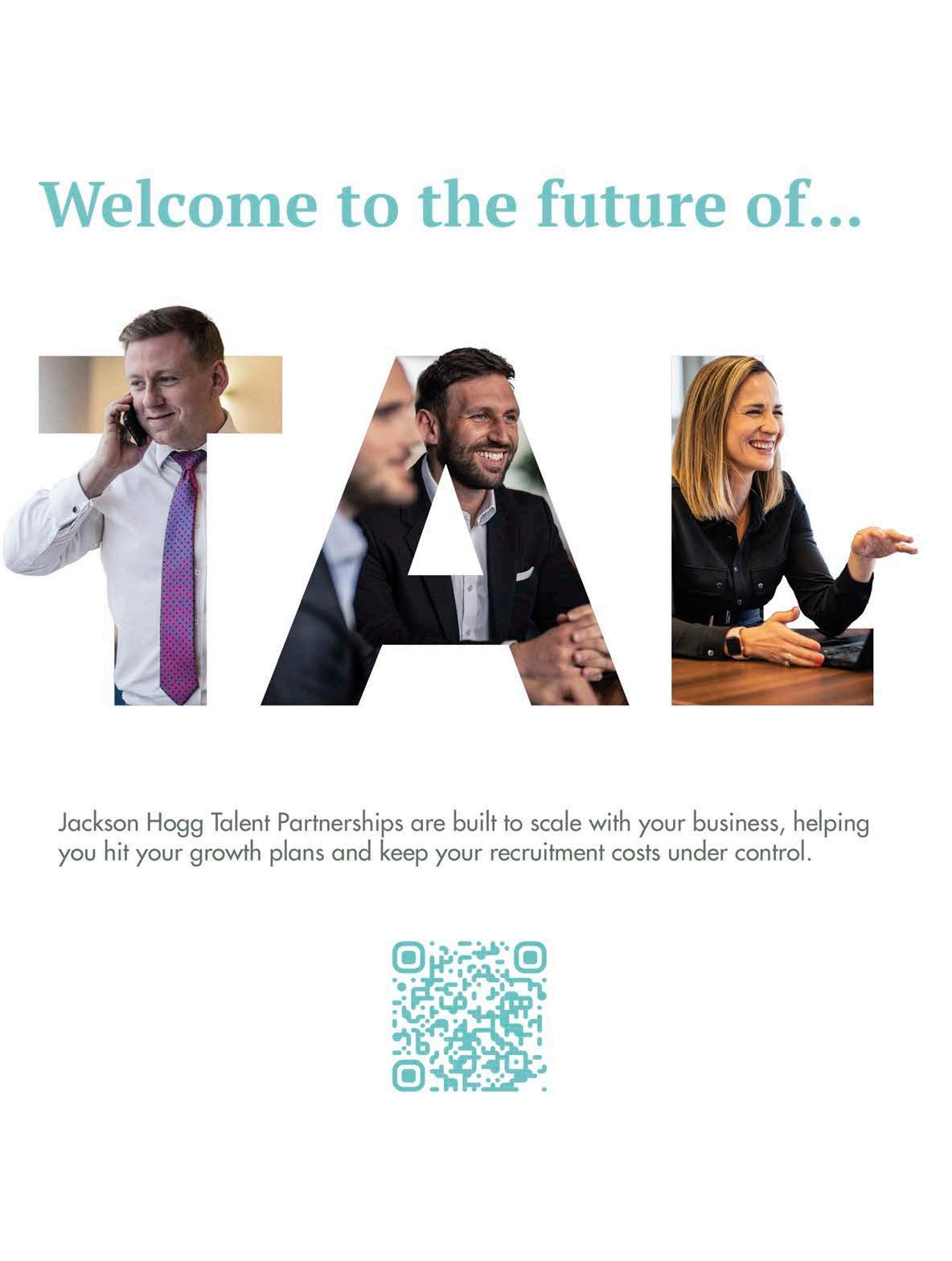

Lycetts
One of the UK’s leading independentlyoperated insurance brokers, Lycetts provides bespoke financial services and commercial, private client, farm and estate, and bloodstock insurance advice.
Strong partnerships are the cornerstone of business success. And one firm ensuring robust collaboration is independently-operated insurance broker Lycetts. Here, Steven Hugill hears from regional director Neil McGuire about the company’s commercial insurance division, and how its co-operative qualities are helping clients lay foundations for great achievements.
www.lycetts.co.uk
LinkedIn: Lycetts
People; process; product.
The route to business success, go the many commercial self-help compendiums, is found at the intersection of the so-called ‘three ps’.
Yet any firm truly driving for growth knows accomplishment comes not without a fourth directional marker: partnership.
Businesses advance when they work with a partner that understands its nuances; when they work with a partner that ignites innovation; when they work with a partner that transposes challenge into opportunity.
A partner like Newcastle-headquartered insurance broker Lycetts.
An ally to organisations for decades, its tailored commercial insurance services are a critical element of myriad operators’ blueprints across similarly multifarious sectors.
And they are delivered with company
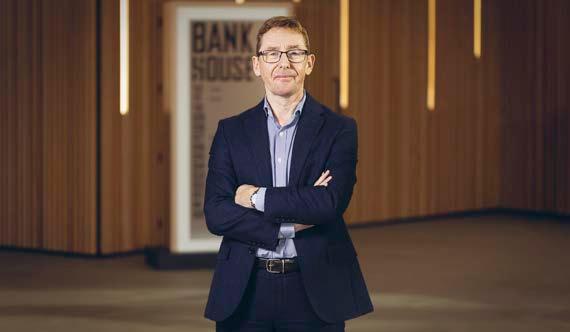
comprehension at the core.
“Our depth of knowledge sets us apart; we get to know clients’ respective worlds,” says Lycetts’ regional director Neil McGuire.
He says: “We understand them and their business, where they have been and where they are going.
“A crucial factor is the open and frank discussions we’re able to have.
“Understanding a business in the here and now is extremely important, but so too is getting to know its future plans and any changes and influences it believes are going to cause an impact.”
“Being nimble is important, but being prepared is essential,” says Neil, who leads Lycetts’ network of offices across the North of England.
He adds: “A client, for example, might want to expand into other territories, having exhausted the UK as a market, but it may not fully know what that entails.
“By really understanding a business, though, and then harnessing that knowledge with the strong relations we have across the insurance market, we’re able to properly align a programme to meet such a goal.
“We offer a comprehensive service; insurers are looking for well-managed risks, so we work with clients to make improvements in the areas that attract insurers’ eyes, across things like health and safety and continuity planning.
“Robust documentation helps sell the management of a business to an underwriter.”
Equally fundamental to Lycetts’ service delivery is the ease in which it traverses multiple sectors.

From family protection trusts and SME and renewable energy insurance, to guidance across areas including construction, education, property investment, play centres, hotels and zoos, Lycetts’ support is as varied as it is deep.
Crucial to such, says Neil, are the partnerships crafted between the company’s commercial insurance division and its sister rural insurance and financial services teams.
He says: “We aren’t a silo that stands alone; we are interacting all the time with our colleagues, and that makes a big difference to the strength of our delivery.
“For example, an existing rural client might be exploring a new venture that needs commercial insurance support.
“As they are going down that different route, it presents scope for us to look at things in fresh ways, and we are very good at finding solutions for something that might be out of the ordinary.
“It’s why we have such a range of clients and sectors, and a good number of niches, like leisure, wine merchants and family trusts.
“Renewables is another strong area; we began with Scottish hydro schemes, which we added to with wind, solar, biomass and biogas when the Government began handing out generous incentives for energy production, and we continue to build our presence in
the industry today.”
Similarly impactful, says Neil, is Lycetts’ place within the Willis Network, an independent broker alliance that extends both its sectoral and geographic reach.
He says: “The Willis Network gives us global stretch and enables us to access some niche areas like aviation and oil and gas, by finding routes to experts in those places.
“Additionally, if a client expands internationally, the Willis Network means we don’t have to part company – it has offices around the world, so we can retain a relationship.”
Those global ties are supplemented by a solid domestic base, with Lycetts having last summer switched its UK headquarters from Newcastle’s Milburn House to the city’s new Bank House high-rise.
And Neil says its fresh surroundings, which peer down onto traffic snaking along Tyne Bridge, is adding momentum to its own ambitions.
He adds: “Our plan for this year and beyond is to grow.
“We have a good commercial book, but we’re ready to do a lot more, and our offices provide a fantastic environment in which to do so.
“They are a real statement of our intent to continue delivering services for clients, old and new, that help them achieve their goals.”
To find out more about its commercial insurance packages, call its Newcastle head office on 0191 232 1151 or email neil. mcguire@lycetts. co.uk
Lycetts is part of the Benefact Group, a family of specialist financial services businesses that gives all available profits to charity and good causes.
You may not have heard of Project Speedbird. But you soon will. It is a major partnership between British Airways, LanzaJet and Teesside-based Nova Pangaea Technologies, and has just secured £9 million Government funding to produce sustainable aviation fuel (SAF) and establish the UK as a decarbonisation world leader. The plan is to produce more than 100 million litres of SAF every year, which will annually reduce CO2 emissions by 230,000 tonnes. Leading the project is Sarah Ellerby. Here, she tells Colin Young the story of the Yorkshire farmer’s daughter who, having become the best professional cue sports player in the world, has returned to the UK to put the North East at the heart of watershed environmental change.

4Sarah Ellerby was once the world number one in eight-ball pool.
‘The Ice Maiden’ won more than 80 championships when she competed for several years on the circuit in the US in the late 1990s and 2000s, until her retirement in 2008.
She could walk back into the top echelons of the sport tomorrow – in a billiards blaze of glory too – and, because it’s in her nature, would very quickly start competing for that number one spot again.
But she’s having none of it.
Sarah was made for business and has returned to her North East roots to prove it, no matter how tempting the offers are to go back to the table.
“I don’t even own a cue or a table,” she says.
“I just haven’t got the time.”
Having completed several marathons, she now prefers running or cycling close to her home near Thirsk, North Yorkshire,
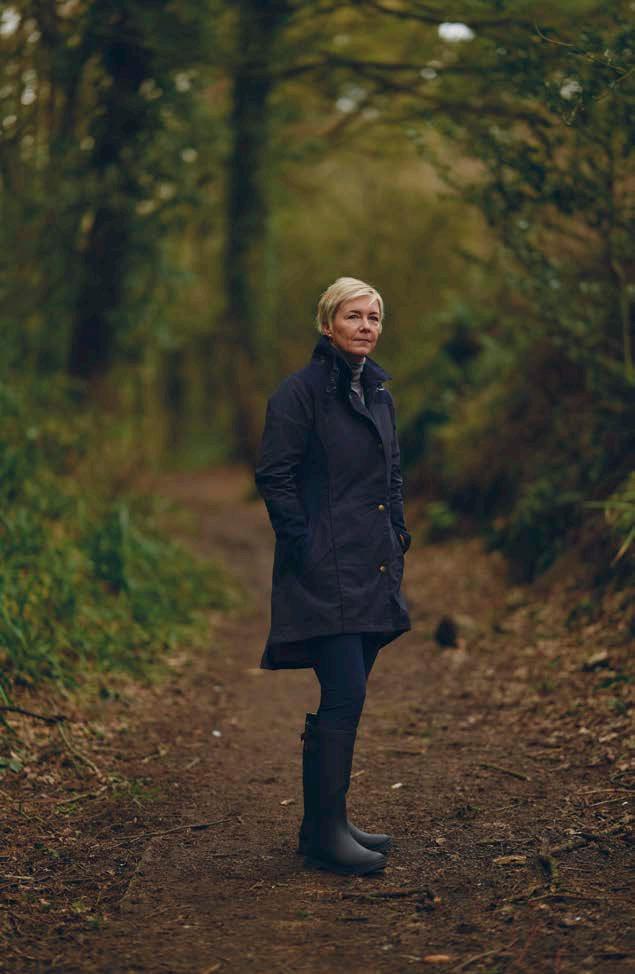
where she’ll ‘potter around the garden’ during her rare moments of downtime.
But the green baize burns deep.
“I really miss playing – more so snooker,” she says.
“I really love the challenge of the big table and tight pockets.
“I actually said to my family a couple of years ago, ‘right, I've got a week off. I want to go find the snooker table and hit some balls for a couple of hours.
“I can pick up a cue, play anybody and it just clicks. I go straight back into the groove.”
“And I get lots of challenges.
“I’ll play one-handed, I’ll play lefthanded. Realistically, you're going to be on the worst end of it because I'm going to beat you – and it won’t take long.
“I do miss it. I miss having a table to have a bit of a tinker and pot a few balls.”
But Sarah is not back in the region to play around.
She is here for business and, as chief executive of cleantech company Nova Pangaea Technologies, wants to build on the momentum of the significant Government funding that is backing Project Speedbird – which also involves British Airways and LanzaJet – to produce sustainable aviation fuel (SAF) and put the UK at the forefront of the fight against global warming.
Nova Pangaea Technologies has been awarded £7.5 million under the scheme, and took on multi-million-pound investment from British Airways’ and Aer Lingus’ parent company International Airlines Group last year.
The Teesside-based company is pioneering technology that transforms wood and non-food agricultural waste into high-value products, such as ethanol.
LanzaJet’s proprietary technology converts ethanol into aviation fuel at its alcohol-to-jet plant in Georgia, in the US.
It is the first of its kind in the world. But not the last.
Sarah’s task is to identify at least three sites across the country to produce biofuels by 2028.
These biofuels will then be converted into SAF for British Airways’ flights, helping meet the UK’s SAF mandate of producing at least ten per cent of airlines’ jet fuel from sustainable feedstocks by 2030.
“This is not just a big deal for Nova Pangaea Technologies, it's a big deal for Teesside – it’s a big win for Teesside,” says Sarah.
“We need to deliver a complex network of facilities for Project Speedbird, and we're going through the site selection process.
“I’m hoping the headquarters and first commercial facility will be on Teesside.
“I’m keen to locate here because of the amount of biomass handling we need to consider to deliver 190 million litres of ethanol.
“This is a very complex programme that we're delivering for British Airways in the UK, which has made us take a little bit of a step back and really think through the network of facilities, infrastructure, utilities, rail, transportation – the whole lifecycle analysis and greenhouse gas emission profile.
“I'm really excited about the next phase of our business, and the delivery and execution of Project Speedbird.”
MBA-educated, Sarah was destined to work in the family business, but her deadly acumen on the snooker table was to take her on a journey very few from North Yorkshire will ever make.
She went from beating her brother to the local league and winning more than 70 titles in the UK, including the 1997 European Championship, in the process representing county and country.
But, frustrated by a lack of respect by the game’s governing bodies, she left home to take up the tour in the US, where pool is a popular sport.
After gaining an extraordinary talent
visa for America, she travelled the country, often taking ten to 16-hour trips for competitions to break into the professional circuit, and worked her way up the world rankings – surging from 50th to the top within four years – to become one of the biggest stars in the game.
And while sweeping all before on the green velvet, the star from the North was also developing a keen sense of the business world, securing lucrative commercial contracts to put herself at the forefront of a sport where image, especially for American fans, is key.
“I was doing my own sponsorship deals in my teens,” she says.
“I had cars before I could drive.
“I was a professional athlete for nearly 20 years, and transitioned over into business quite seamlessly, because I was used to doing deals and strategic partnerships.
“I could see things.
“I was a natural deal maker and was always aiming high with whatever I did, whether it was sport or whether I was just starting to climb the ladder, which I climbed quite fast from a business perspective.”
Sarah retired from competitive sport 16 years ago and set up her own management consultancy, which was focused on turnaround, scale-up and growth, and working alongside iconic brands and multinationals in the health, biotech, energy and natural resource sectors.
Life changed again when she was introduced to The Honourable Robert Hanson, the Yorkshire businessman and financier, at the Kentucky Derby.
He heard Sarah’s story, introduced her to energy and has watched her never look back.
Sarah says: “We had a very memorable couple of days at the Derby, and we've been colleagues and friends ever since.
“He’s a global and international financier, who really shaped me from a

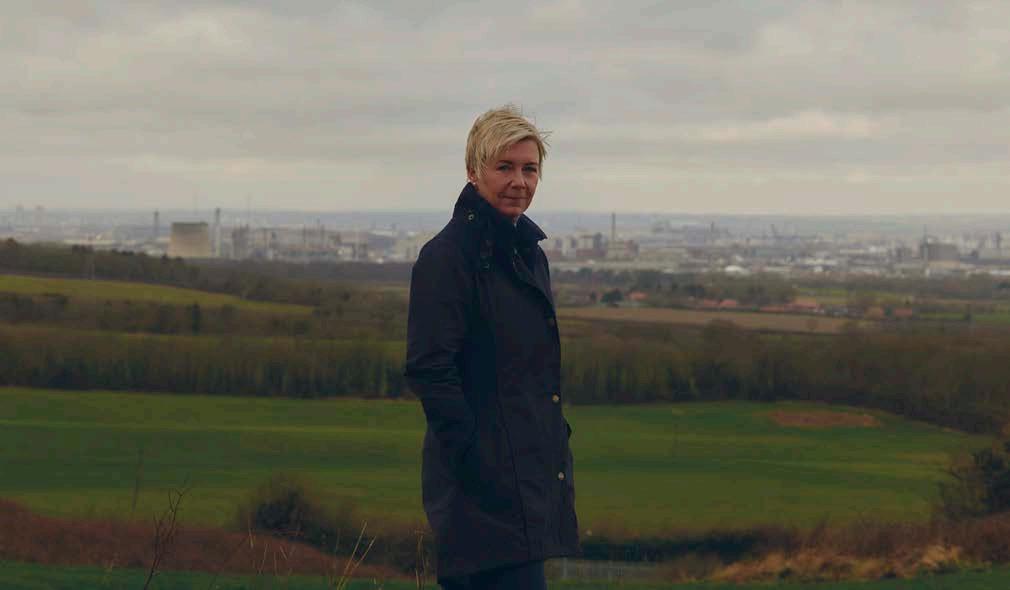
finance perspective, by giving me lots of exposure to various deals and industries.
“I got a real schooling in his network; I spent 12 years looking at deals and different sectors, which was a steep learning curve, but the more I got into it, the more I loved it.
“The whole exploration side of things is fascinating; building out the whole capital programme in really challenging jurisdictions, where you have to land on the side of the mountain, build ice roads, helicopter in heavy drilling equipment, build out the budget and programme, and then get investors to back it.
“That was a challenge for me, and I really enjoy where I am now because of my time there.”
After 18 years in the US and various chief executive roles within energy and natural resources, and sensing the UK was starting to take carbon emissions and sustainable energy seriously, Sarah wanted to bring her experience and network back to the region.
She landed at Nova Pangaea Technologies, which operates from a base on the Wilton International site, near
Redcar, where she’s looking to build a team of up to 100 over the coming years.
She says: “I was starting to get itchy feet in the US, and I thought to myself, ‘wow, look what's going on in the UK’.
“We've got energy and renewables, we're leading on innovation and we just need to get over the hump on the funding requirements from an innovation perspective.
“I thought, ‘it's time to return, to come back and bring nearly 20 years of international experience to the region where I was born and bred, to have impact’.
“And I'm not just coming back for the sake of it – I want to shine a light on the region.
“But just because I’m the chief executive doesn't mean I know everything.
“That's why you surround yourself with smart people and build your team.
“If you have the right people and the right mindset and attitude, you can accomplish anything.
“The UK probably needs to invest £40 billion-plus per year to be able to
realise the mandate that’s been set, which is significant investment.
“The sector has the potential to provide more than 20,000 jobs and we're looking at in excess of £3 billion of economic stimulus by 2035.
“These are big numbers, and we have a big role to play, which is why we are taking our time; we need to get this right.
“The UK is a hard jurisdiction to get these projects off the ground, but I believe we’ll be able to do it.
“My goal and my legacy is to be able to lift the region back up.
“There have been a lot of failures, a lot of shutdowns, but we can reinvigorate the region with this type of project; invest in our people, upskill, reskill and provide really good quality jobs, which will have positive impacts.
“We need to find a way, from a decarbonisation perspective, because we're seeing the impact of climate change – we're seeing excessive rainfall and excessive heat.
“Time is of the essence. This is real and we need to accelerate.”
Just as they were when she was setting out on her career in pool, Sarah’s days are long.
Back then, she could spend up to ten hours a day practising – “I don’t do anything by halves” – but, as a farmer’s daughter, she’s not afraid of hard graft and long hours.
And as much as there may always be a temptation to pick up the cue again and return to what she once did better than anyone else in the world, Sarah’s focus is undoubtedly on making the world a better and cleaner place from North Yorkshire, rather than North America.
She says: “In order to do what I'm doing right now, you've got to have tremendous resilience – and that’s my work ethic.
“If I'm going to do it, I'm going to do it well, or I'm not going to do it at all.
“It's very black and white with me. I’m in or out.
“It’s lonely at the top because it's not a team sport.
“I was a loner on tour, which is how I had to be, and it is very similar as a chief
executive.
“I want to be successful and I have a tremendous drive.
“I needed that as an athlete to win the amount of times I did, and I have a tremendous drive and passion for what I'm doing right now.”
Sarah adds: “I do miss the US, I miss playing.
“It’s a different way of life, but there are similarities with being an individual at the top of your game in sport to being a chief executive – you need drive and ambition.
“I’ve had lots of opportunities to go back but if I did, it wouldn’t just be turning up for the sake of it.
“I would be turning up to win.
“I couldn’t do it if I didn’t have a chance, and that would take a lot of hard work.
“You never know.
“If I get invited to play in the World Championship again, I might say yes…”

4There have been plenty of announcements and plans for new building projects and schemes in Sunderland over the last couple of years, with a new skyline starting to take shape across Wearside. What can we look forward to seeing and opening in the region over the coming months?
The Riverside masterplan, in particular the Vaux Housing scheme, promises to deliver some highquality homes to Sunderland city centre.
Work on the new Housing Innovation and Construction Skills Academy has also started, with the facility set to champion education around modern methods of construction, to close the skills gap and create a new generation of housing and construction innovators in the North.
At Building Design Northern (BDN), we have the Sheepfolds Stables development opening this year, with some of the region's finest operators lined up.
They include Si King, from the Hairy Bikers; Tam Hassan, who won Gordon Ramsey's ‘The F Word'; and Vittorio Farigu, who was head chef at Gino D’Acampo’s restaurants, who will be opening Vito's Osteria.
We have also recently gained planning consent on a commercial development of 125,000sq ft of industrial space in Hendon.
This is for 19 industrial units, a stone’s throw from Port of Sunderland, which we will be bringing to site in the spring.
Without a doubt, though, the talk of the town is the new film studios development, led by Fulwell 73.
If approved and backed by the Government, the development could see a wave of new employment in a sector the region could hugely benefit from.
BDN has been at the forefront of many of these initiatives and projects, with many other local companies contributing too. How good is this for Sunderland, the region's businesses and the local economy?
Local companies are paramount in the development of city planning.
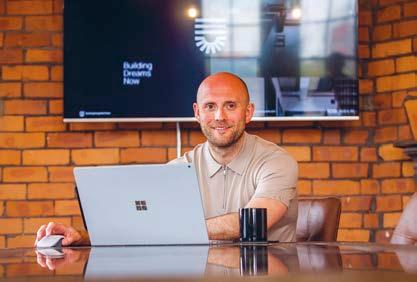
They represent the voice of the city's residents, and are usually aligned to what the city needs and to developing local ecosystems too.
This helps retain the authenticity of a place, and is the heartbeat of any good city.
There are so many excellent local organisations helping to change the face of Sunderland and investing in themselves too, but that only happens when they can see ambitious leadership.
And we have that in Sunderland, with the likes of Hays Travel, Gentoo, Re:Gen Group and BRIMS Construction.
We know from last year's Sunderland Expo that the city and its many partners and businesses are keen to lead the way in creating sustainable cities for the future. Are we seeing proof Sunderland is at the forefront of that in the UK?
It is evident, when the likes of corporate brands such as Nissan, Microsoft and Velux become involved in the process, that great things are happening.
Backed by a really forward-thinking council, proof isn't just on the drawing board, it is actually coming out of the ground.
Closing this edition of North East Times Magazine, Rick Marsden, managing director of Sunderland-based architecture and engineering firm Building Design Northern, looks at some of the upcoming developments across the city and wider region, and highlights how the company is leading the way in sustainable construction. www.bdnltd.com
You only need to look at the number of cranes in the sky and building work to be convinced.
And if the development of the new film studios with Fulwell 73 comes to light, then I think we are in for an even more exciting period.

